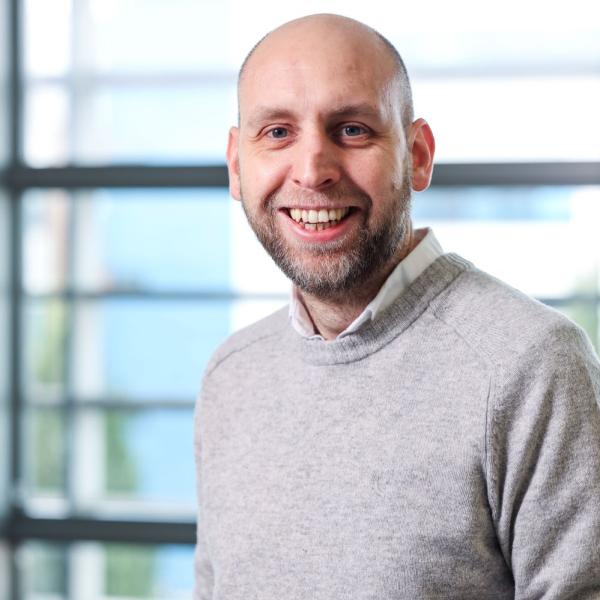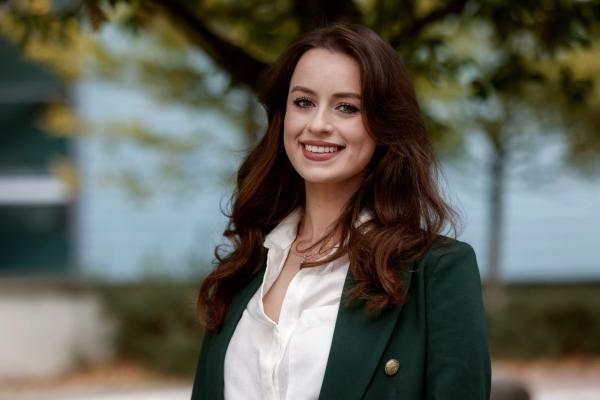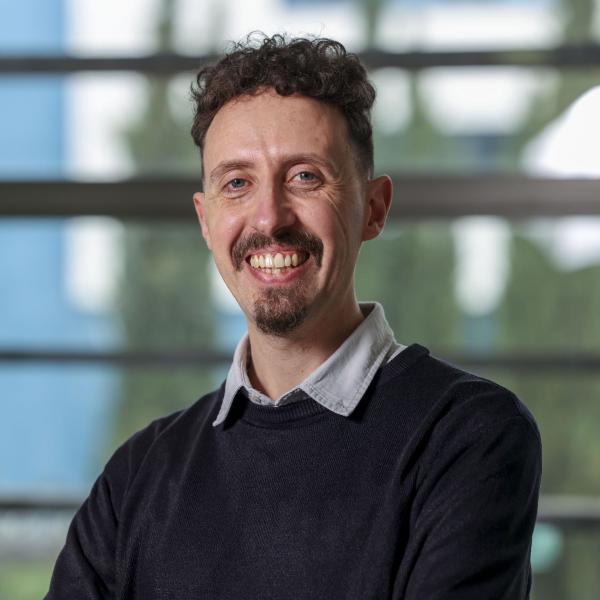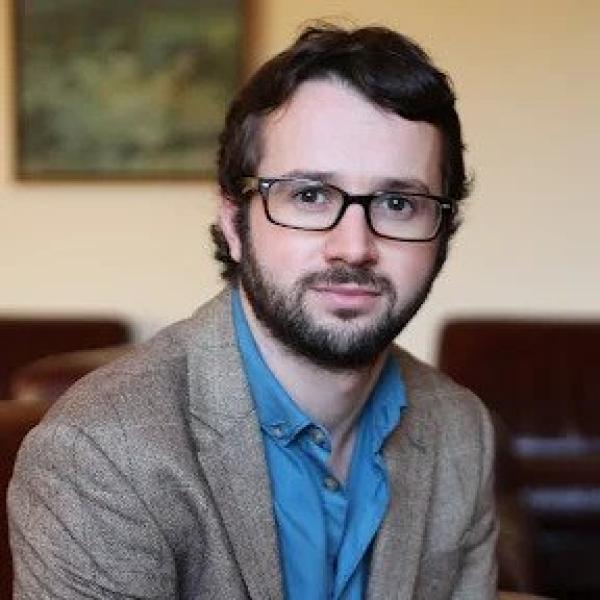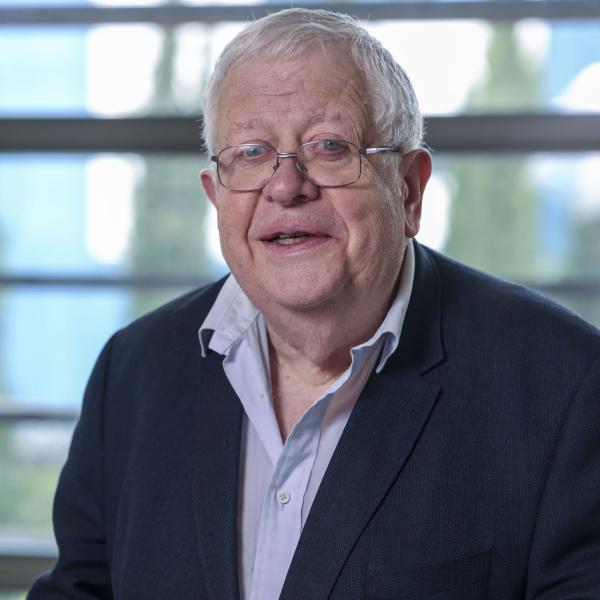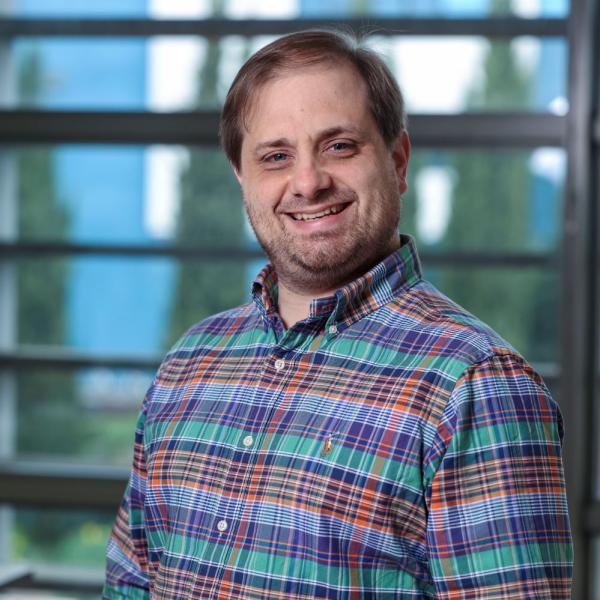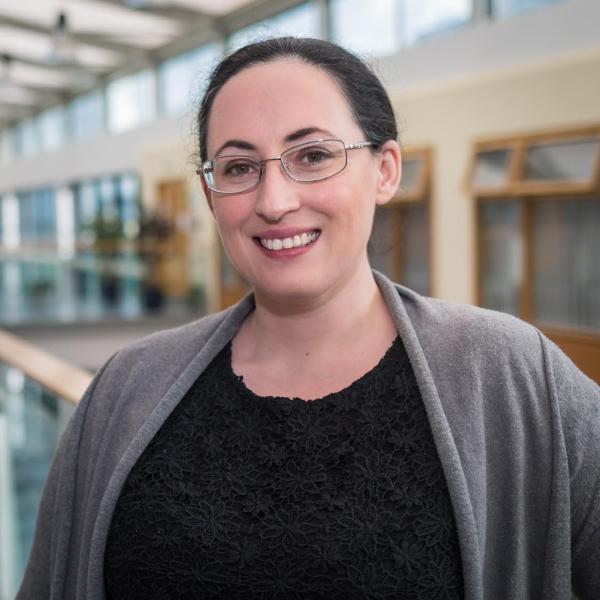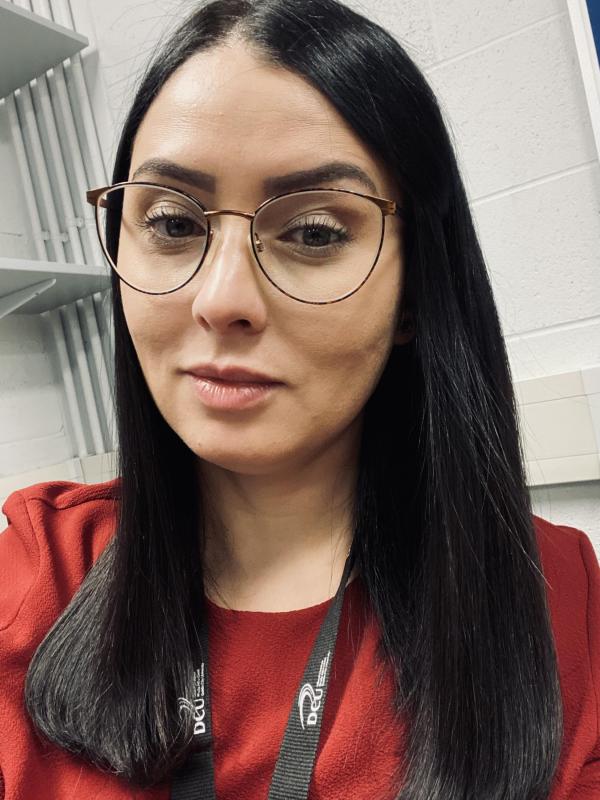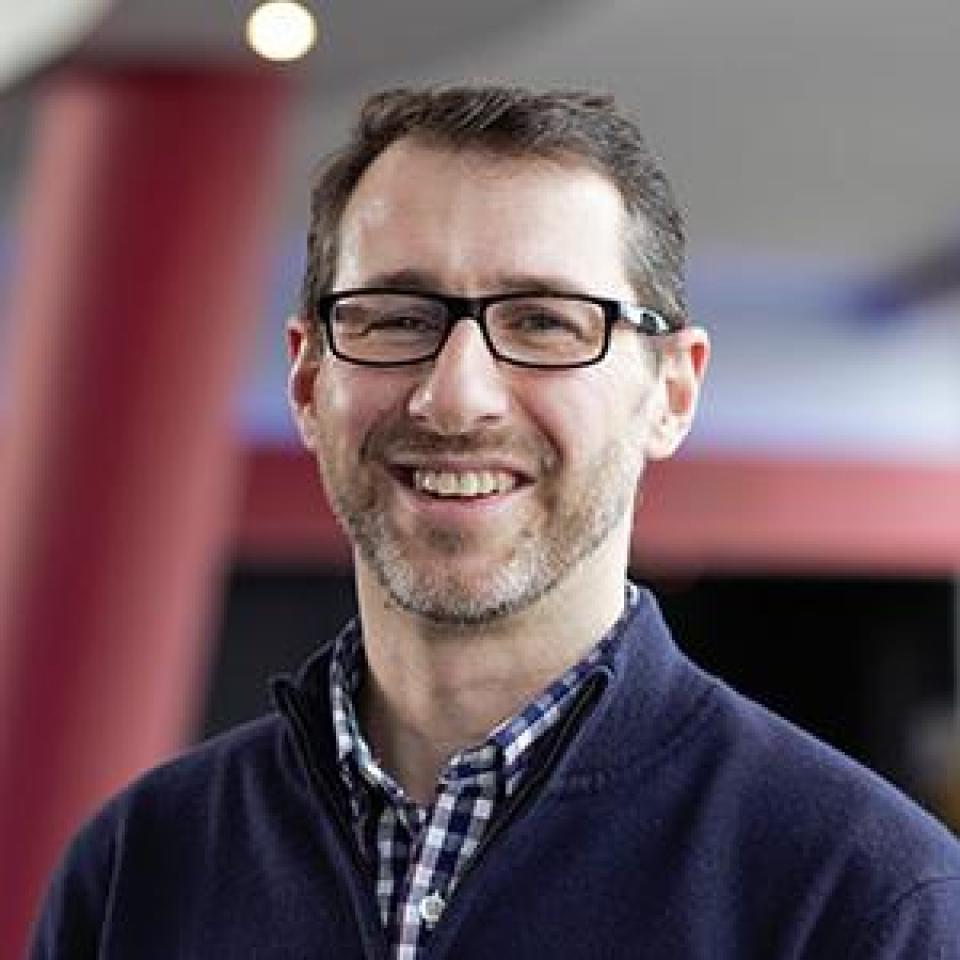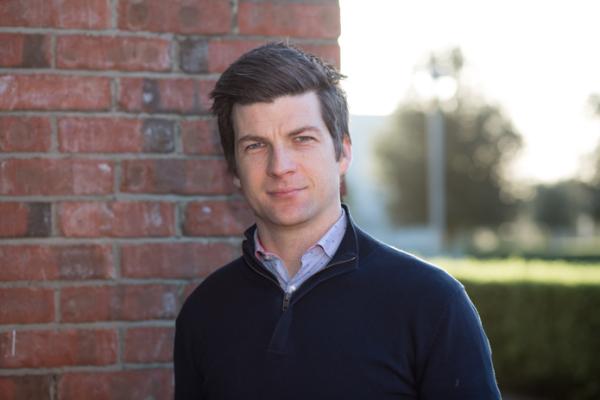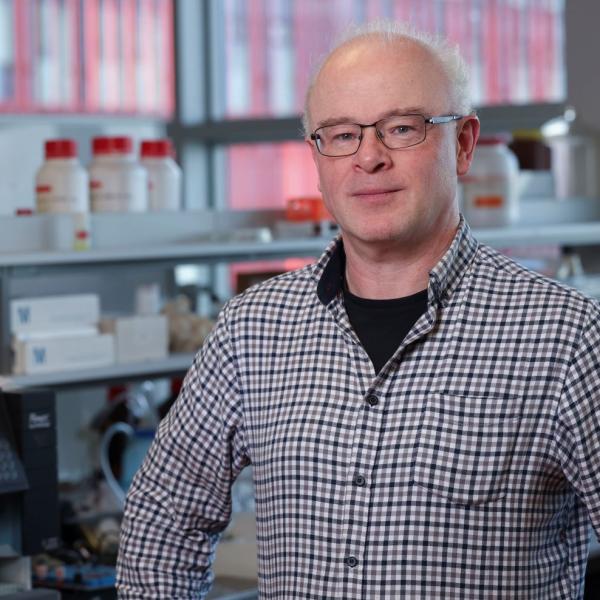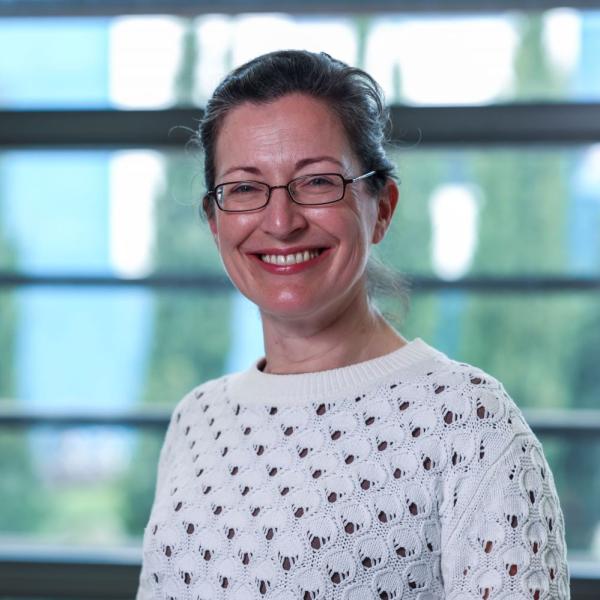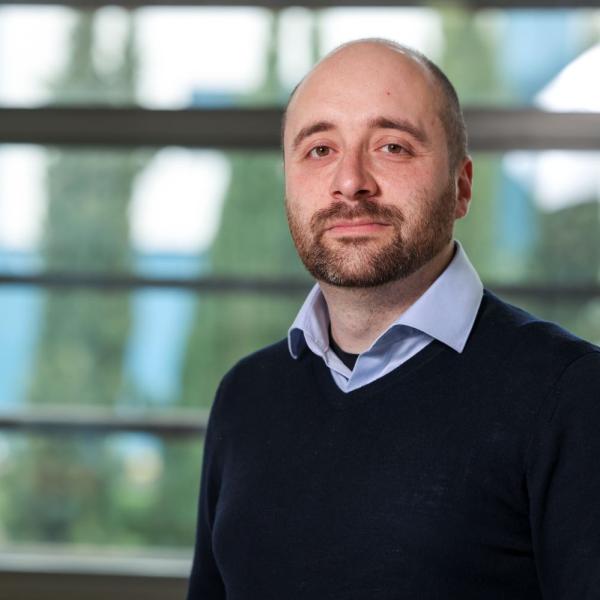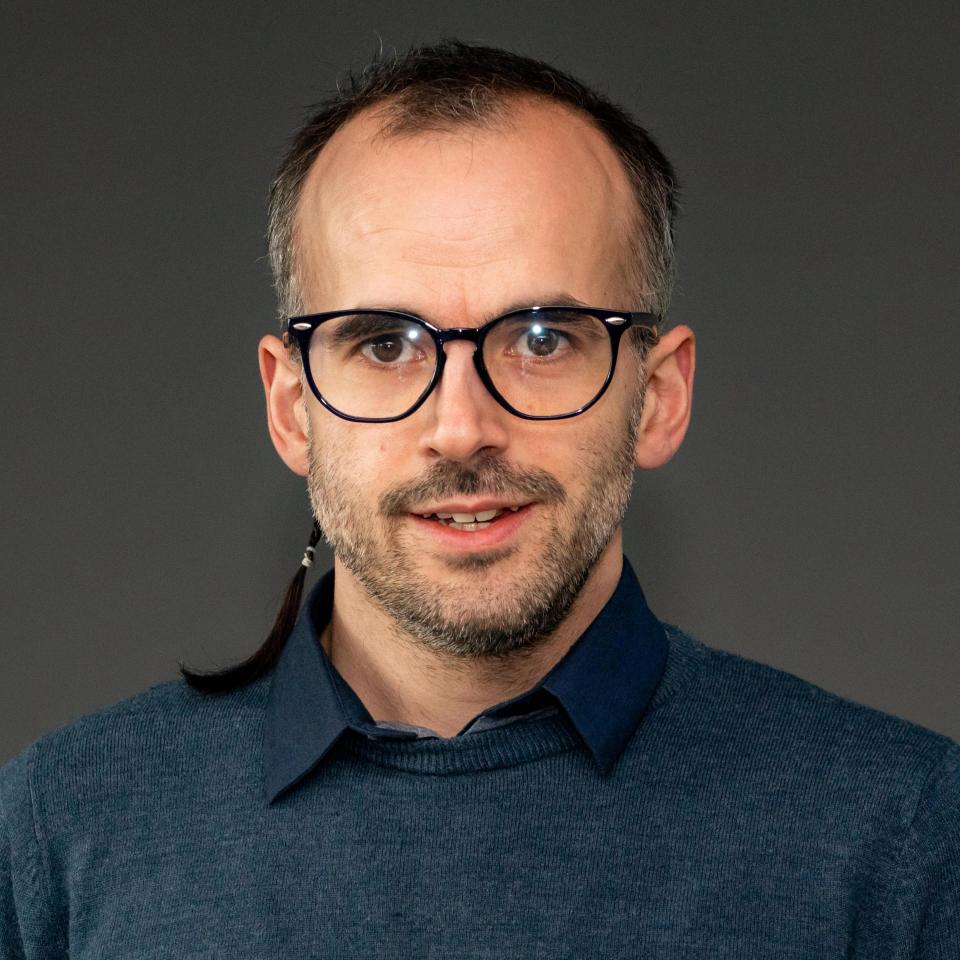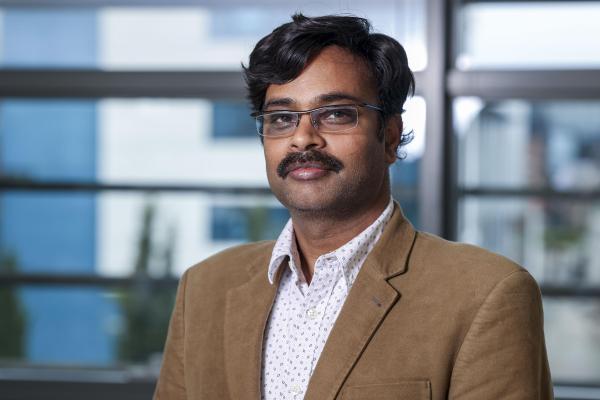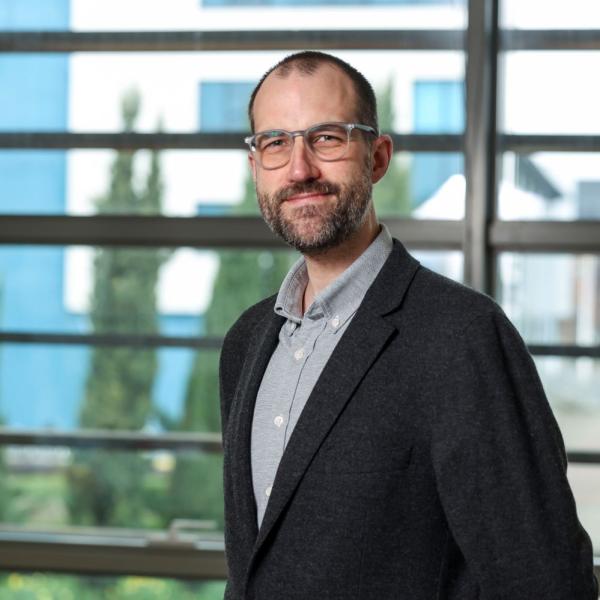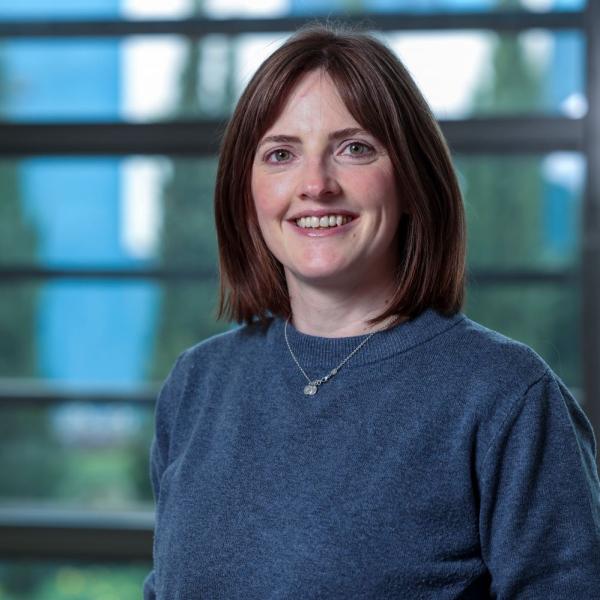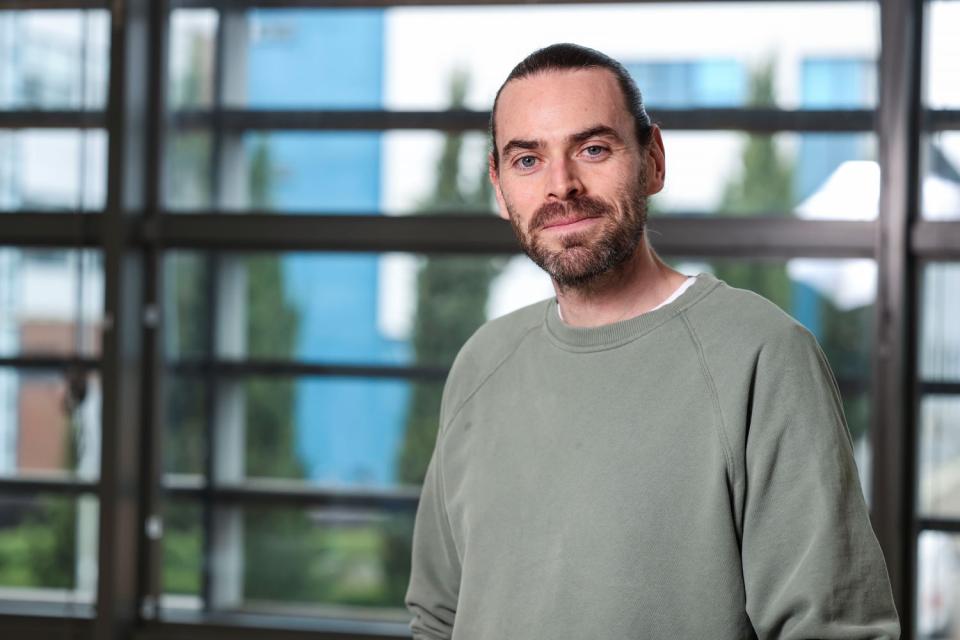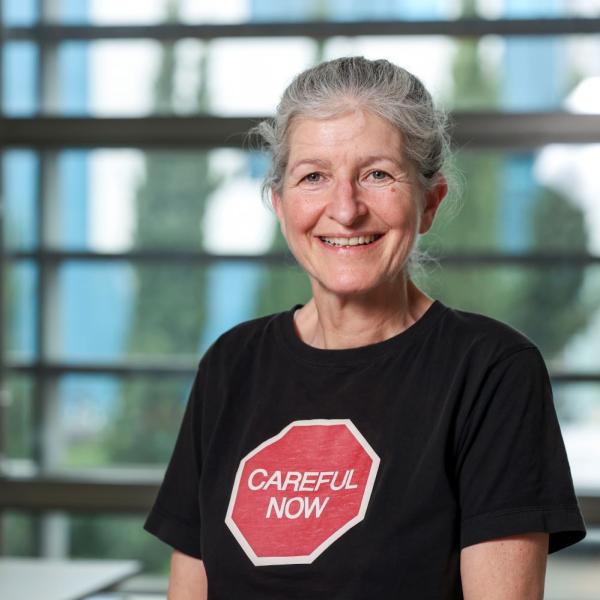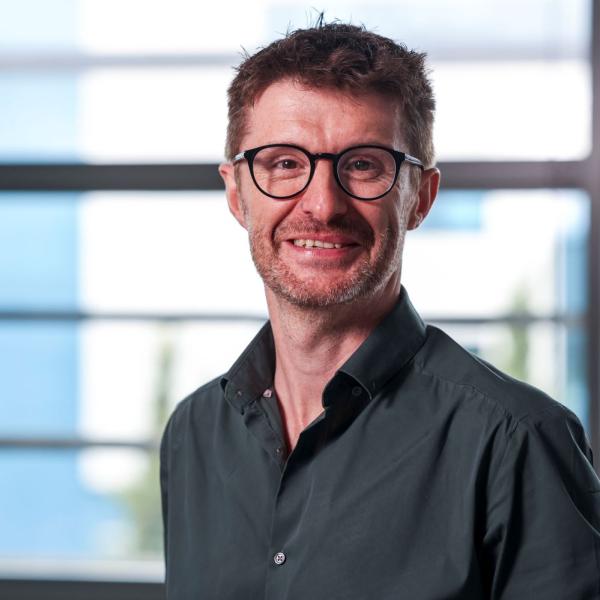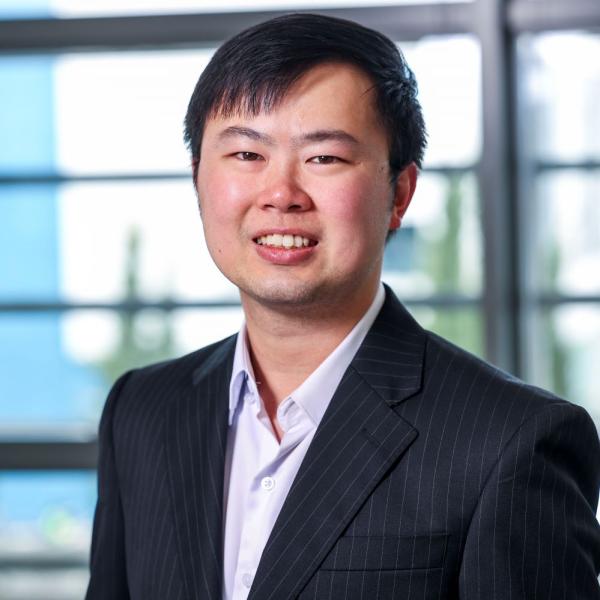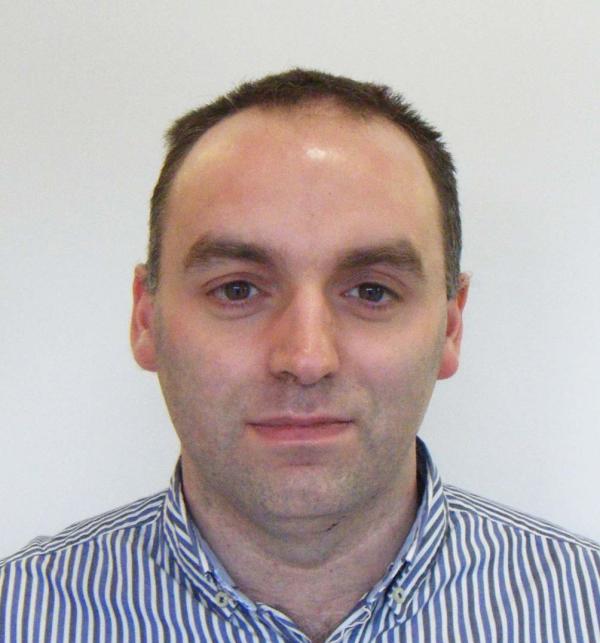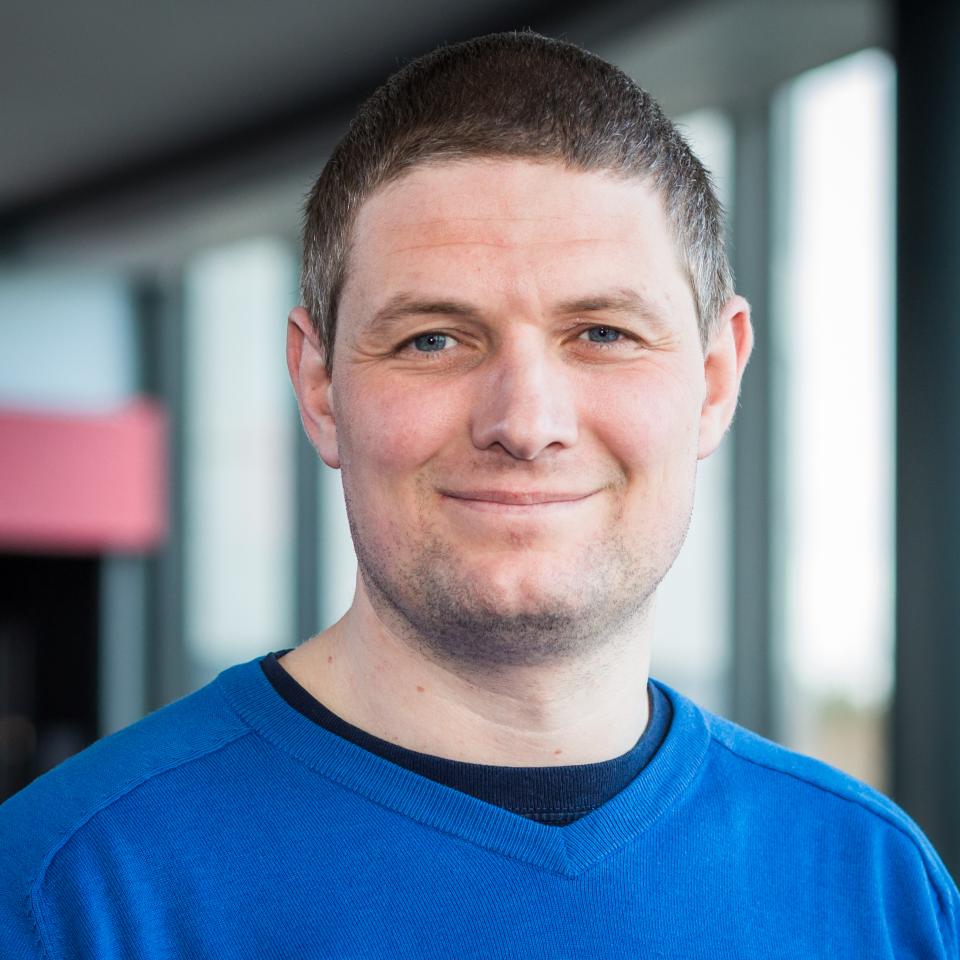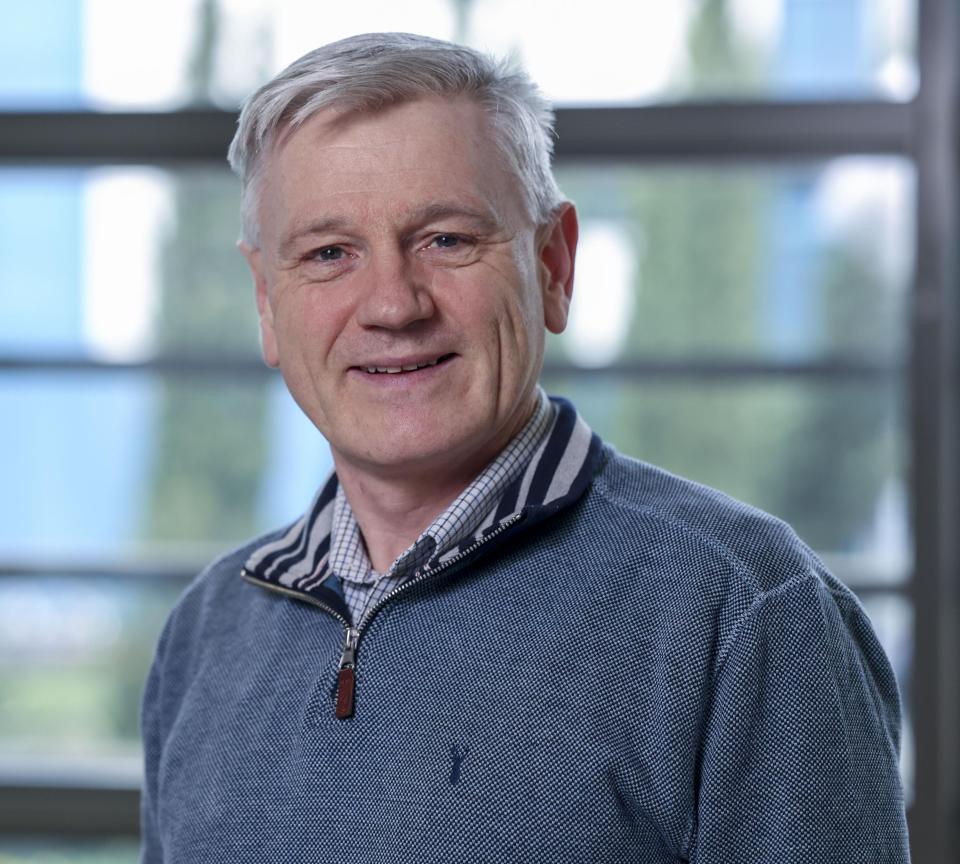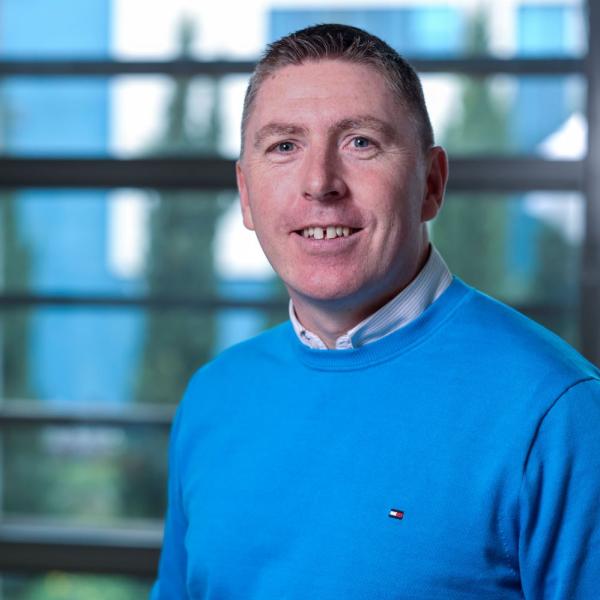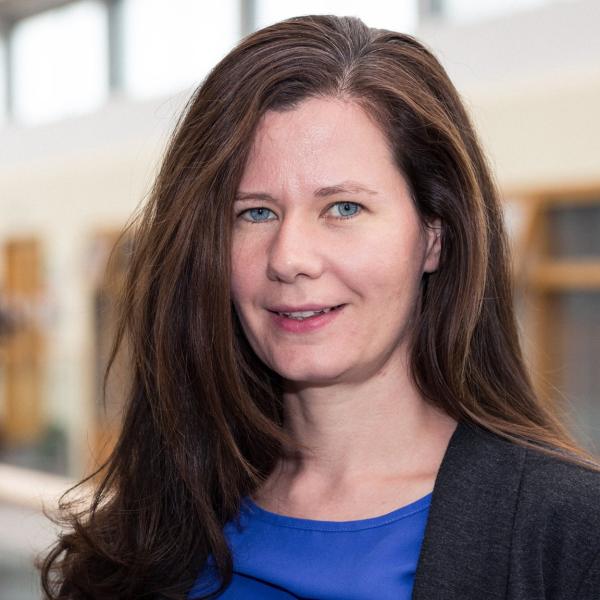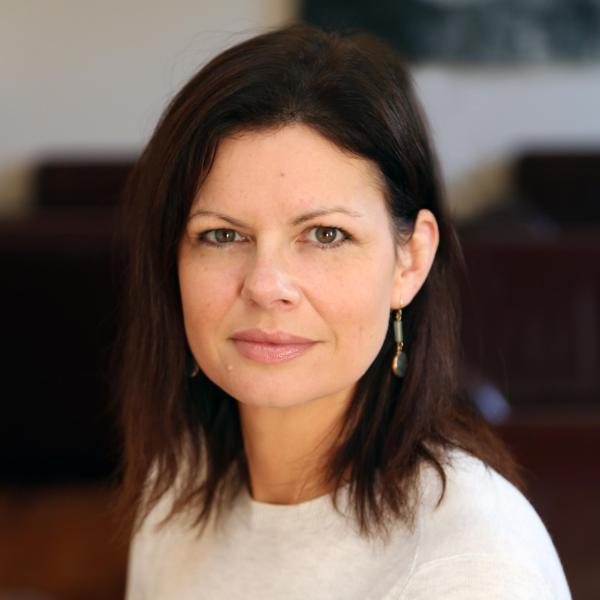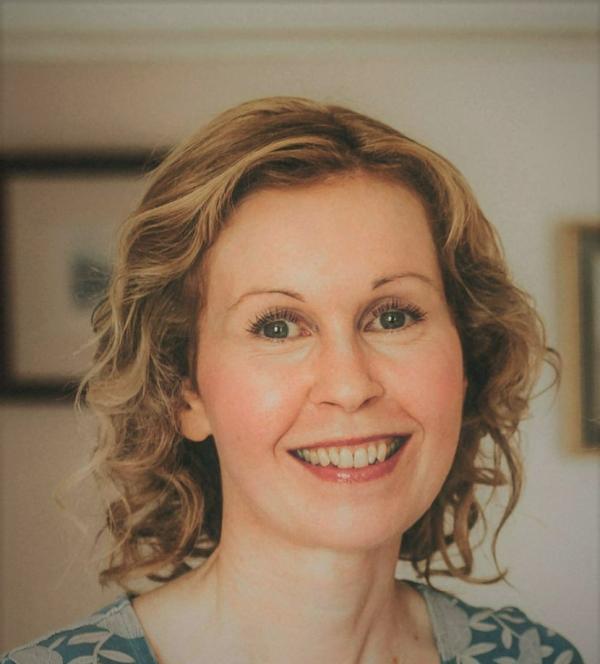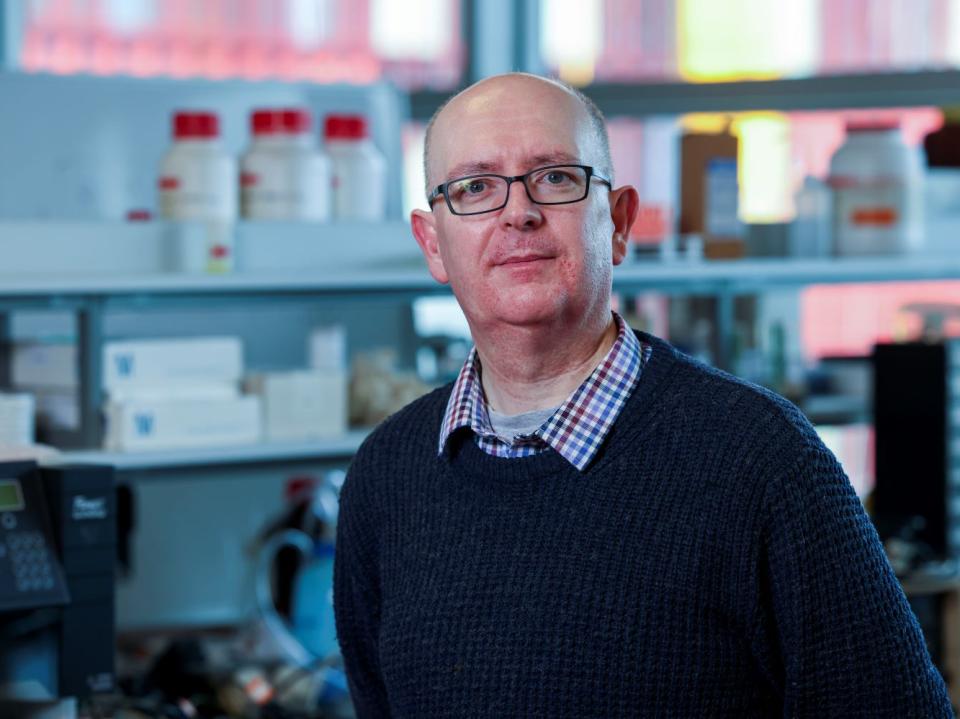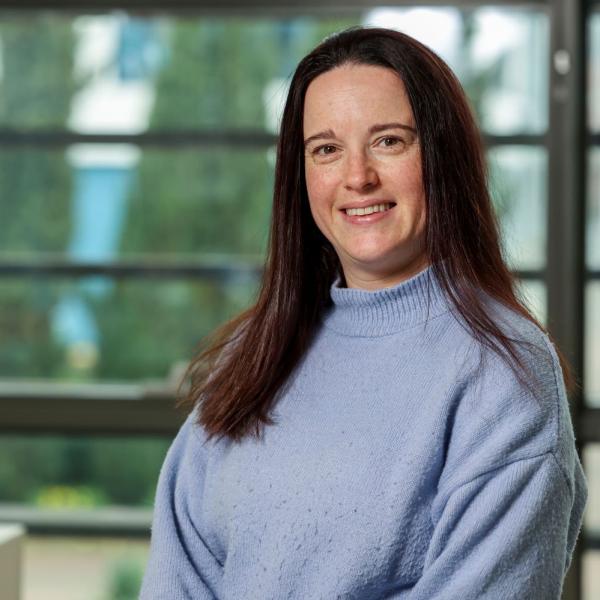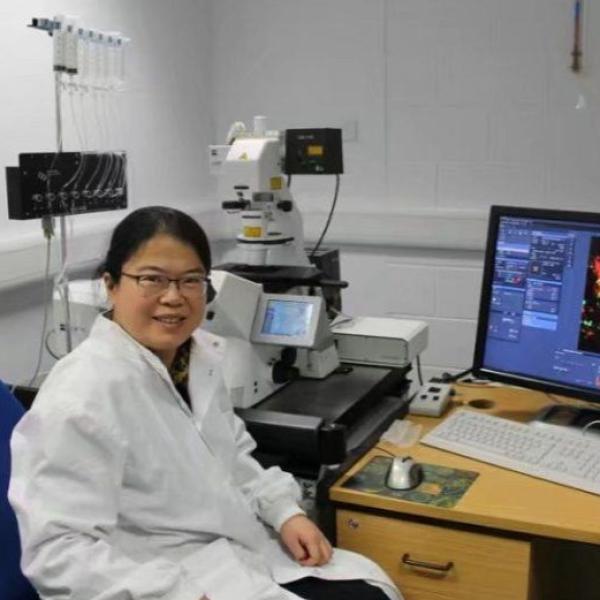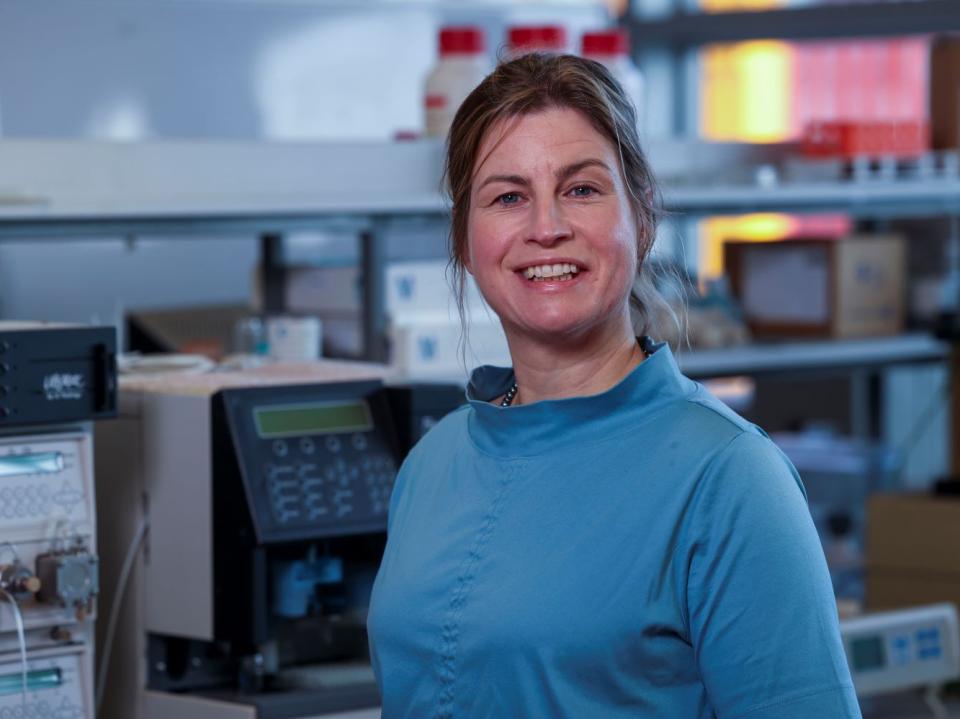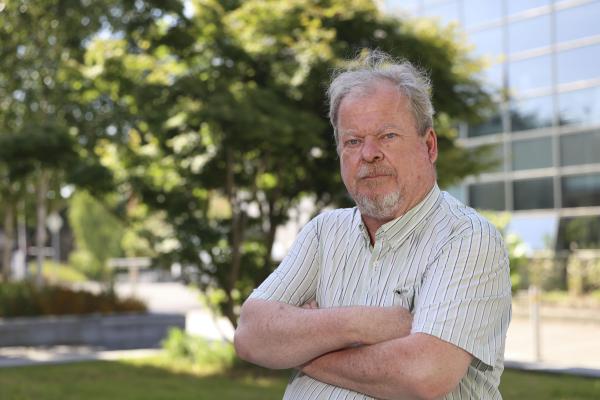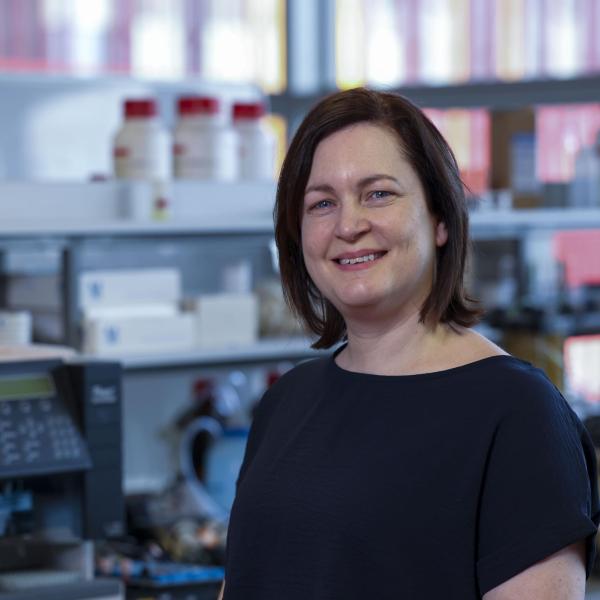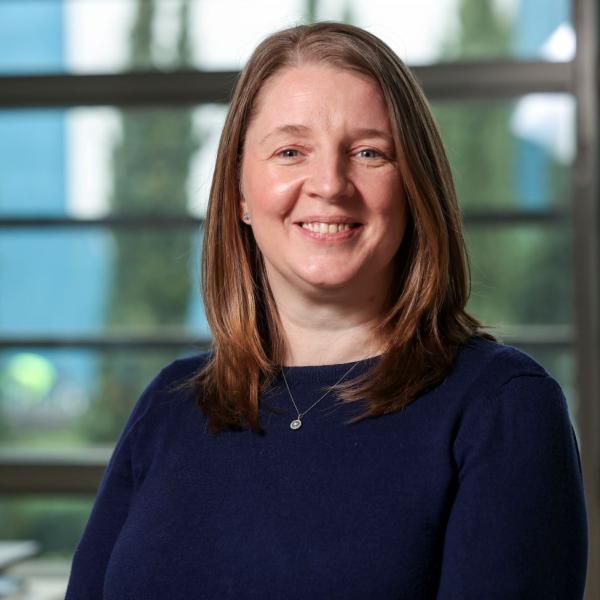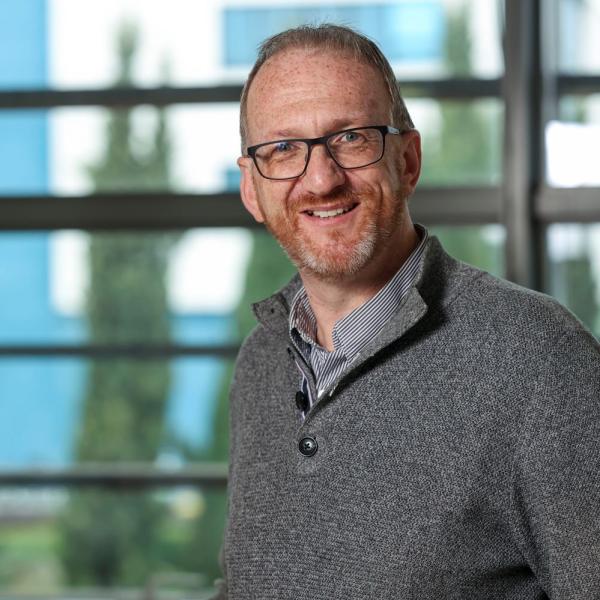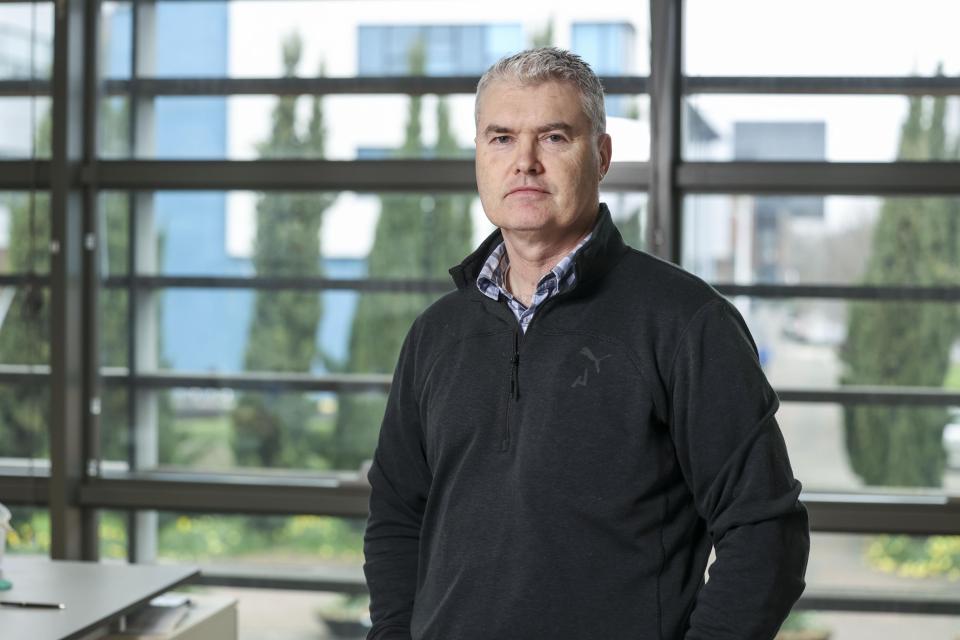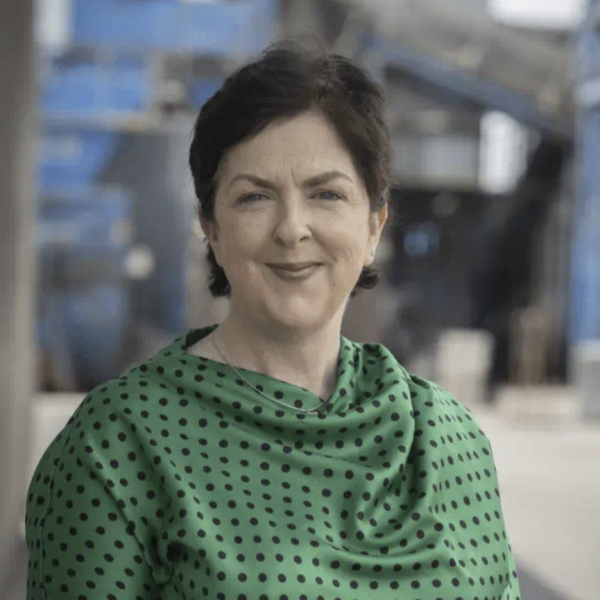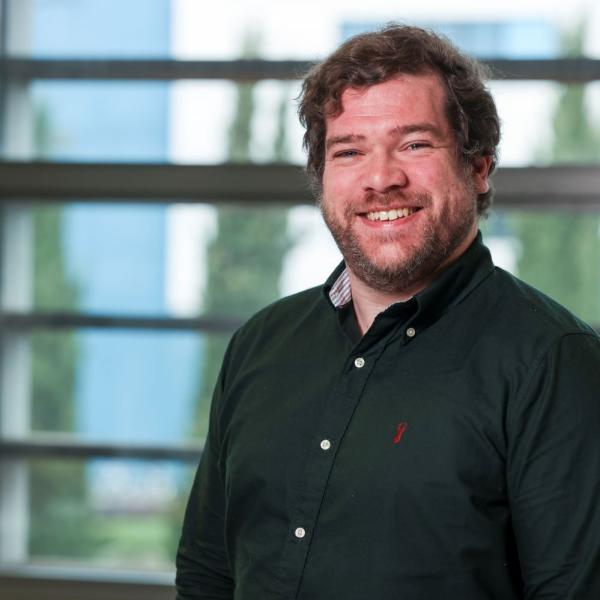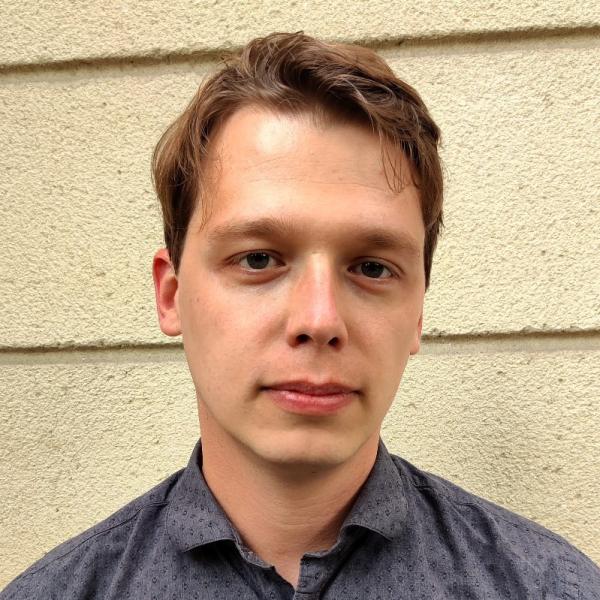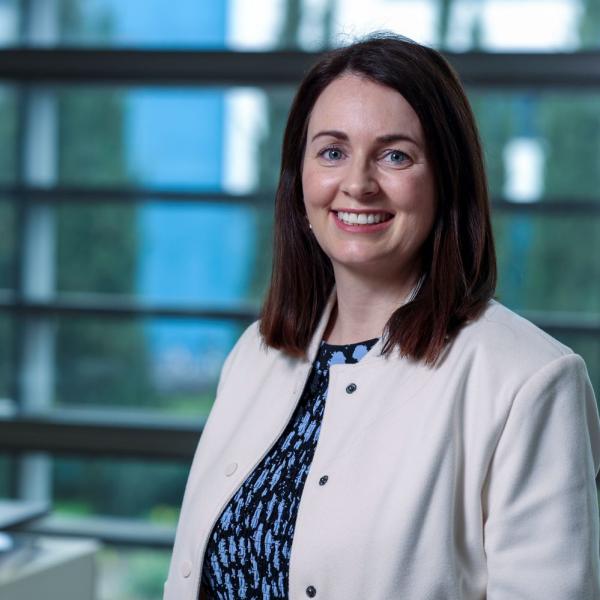
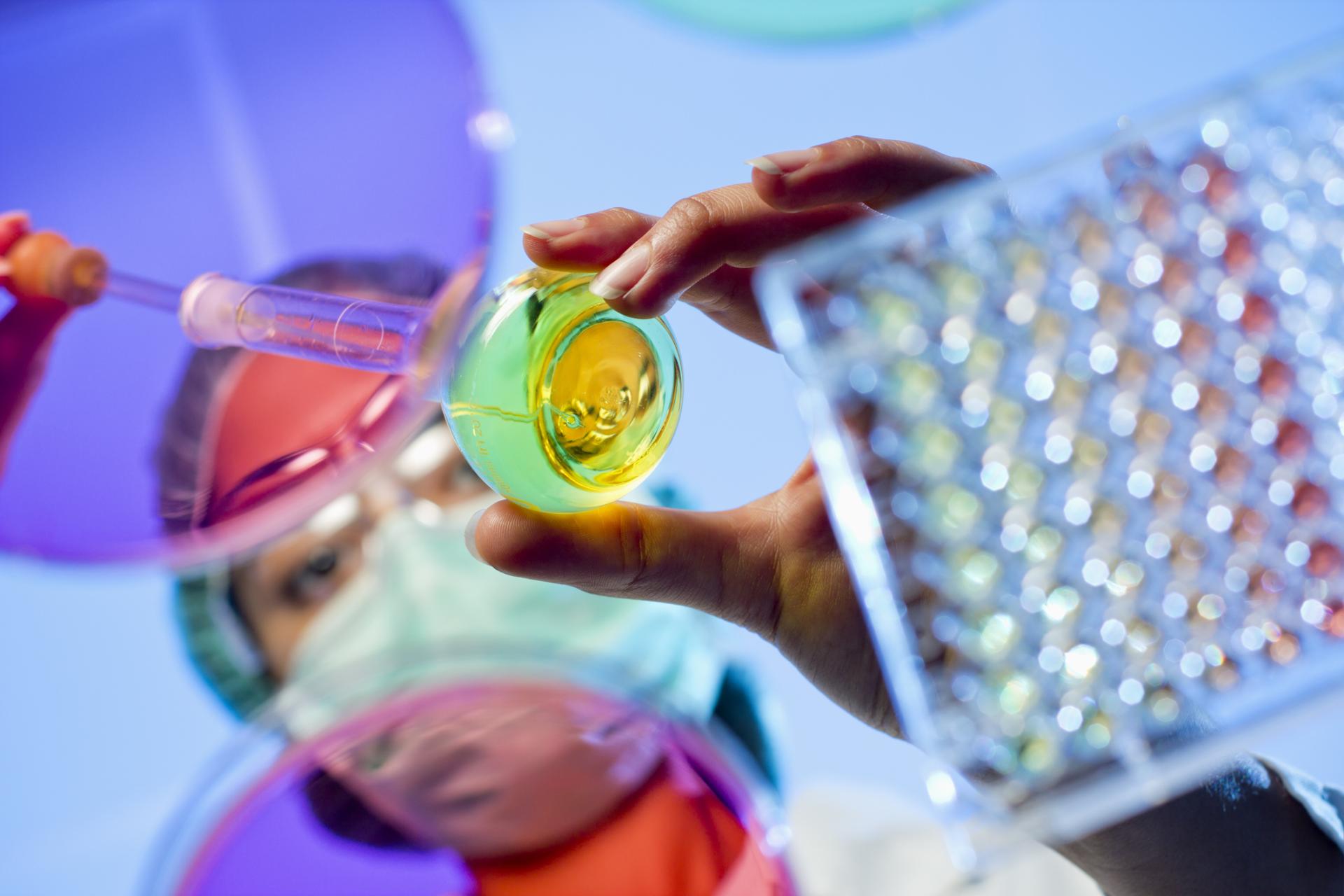
Our People
DCU Life Sciences Institute
Our People
Our LSI membership spans disciplines and schools across two faculties within Science and Health and Engineering and Computing with a common interest in Life Science Research.
This diversity gives us a distinct advantage in addressing relevant research questions that can transform challenges into impact. Our expertise and research ranges from the Genetic Code to the Origin of Life; from Microbes to Infection Biology; from Biosensing to Engineering; and from Disease Treatment to Prevention.
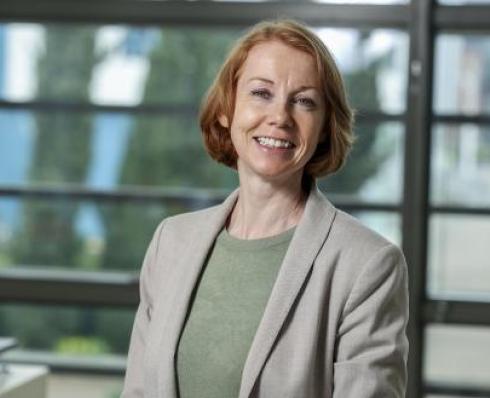
Anne Parle-McDermott is Professor in Genetics in the School of Biotechnology and the founding Director of DCU Life Sciences Institute (LSI). As Principal Investigator of the Molecular Genetics Laboratory and LSI member, her research interests are in the complementary areas of functional genetics as it relates to human health and the application of DNA/RNA-based methodologies for clinical diagnostics and biosensor development for environmental, contamination and pathogen monitoring.
Anne has worked in Molecular Biology for over 25 years having learned the fundamentals while studying at Trinity College Dublin, including being part of the European Yeast Sequencing Project. She earned her doctorate in Molecular Cancer at the Royal College of Surgeons in Ireland and returned to Trinity as a Postdoctoral Fellow where she was introduced to folate research and understanding its role in human health. She progressed to a temporary lecturing position at Trinity before moving to DCU in 2006 where she attained tenure in 2009. Anne has held numerous roles in DCU including Head of School from 2018 to 2020.
Recent research and publications from the Parle-McDermott group have focused on the human Dihydrofolate Reductase (DHFR) gene family, in particular deciphering the function of the DHFR2 gene. Anne’s group were the first to apply CRISPR-Cas technology to environmental DNA for species-specific monitoring. Her team continues to develop this isothermal approach and has demonstrated its capability for lineage specificity, its amenability for on-site monitoring and its versatility to detect any species of interest.
For a full review of Professor Parle-McDermott's profile, please click here
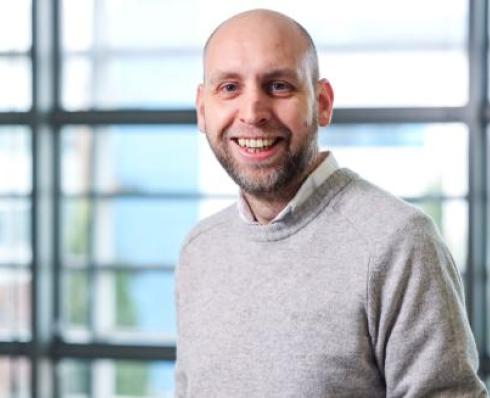
Paul Buchanan is an Assistant Professor in the School of Nursing, Psychotherapy and Community Health (SNPCH) and a member of DCU’s Life Sciences Institute (LSI). As Principal Investigator of the Biomedical Sciences Laboratory his general research interests lie in understanding the role of ion channels in disease. Primarily focusing on investigating the impact of aberrant calcium handling in cancer and how this can be exploited for therapeutic benefit.
Dr Buchanan has acquired 15 years research experience in the fields of molecular biology and electrophysiology working in several world leading institutes. Graduating from Queen’s University Belfast (QUB) with a BSc (Hons) in Biochemistry, followed by a PhD in “Pathogen-Host interactions in the Cystic Fibrosis epithelium”. His first postdoctoral position was at the Royal College of Surgeons in Ireland (RCSI) before returning to QUB as a senior postdoctoral fellow within the Centre for Cancer Research and Cell Biology (CCRCB). In 2016 he took up the position of Biosciences Lecturer in Dublin City University (DCU).
Currently his research focuses on investigating functional intracellular calcium handling phenotypes associated with (1) cancer driver gene mutations and (2) treatment pressures in breast and prostate cancer. Alongside targeting identified calcium aberrations with pre-clinical or repurposed calcium channel drugs as novel therapeutic approaches either alone or in combination within existing approved therapies.
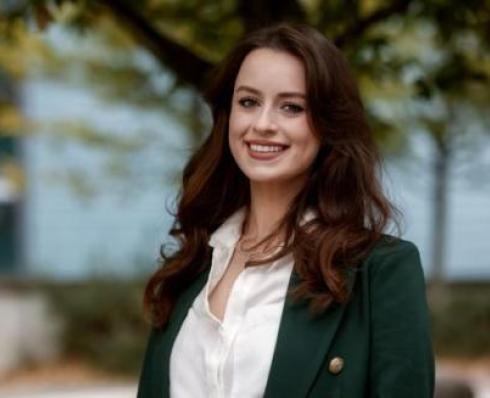
Éadaoin Carthy is an Assistant Professor in the School of Mechanical and Manufacturing Engineering at Dublin City University (DCU). As the Principal Investigator of her research group, her work focuses on the development and application of microfluidic platforms and sensor technologies for point-of-care diagnostics. This encompasses the design of embedded sensors within microfluidic devices for the rapid detection of pathogens, with a particular emphasis on improving clinical diagnostics and enhancing patient care. She is a member of DCU Biodesign, Advanced Processing Technologies (APT), National Centre for Sensor Research (NCSR) and DCU’s research centre for Decarbonisation, Sustainability and Innovation (DeSI).
Éadaoin's completed her PhD in 2019 in the School of Chemical Sciences in DCU, focusing on sensors and point-of-care diagnostics. Over the years, she has dedicated her research to advancing the field of microfluidics, contributing to its application in healthcare settings. Her work has led to the co-invention of a novel diagnostic tool leveraging embedded electrochemical sensors within microfluidic platforms for rapid pathogen detection. She has successfully managed numerous high-impact projects, such as the Enterprise Ireland Commercialisation Fund grant projects, DCU Education Trust and Horizon EU projects. She is currently a funded investigator with Science Foundation Ireland and CRT-AI projects.
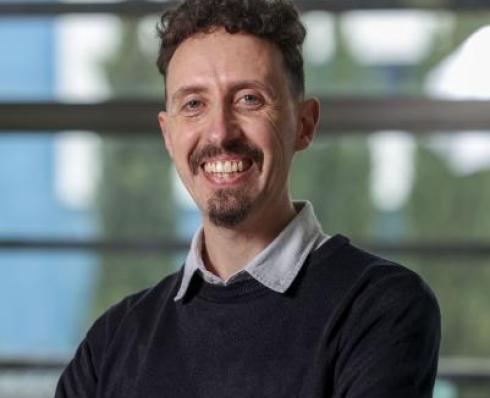
Federico Cerrone is an assistant professor in Bioprocess Engineering in the School of Biotechnology at the Dublin City University.
His research focuses on microbial manufacturing of biobased molecules with an interest that unifies environmental microbiology, biomedical applications and material science. He is a member of the Life Science Institute (LSI) and of the Bioeconomy SFI Research Centre (BiOrbic).
Federico obtained his MSc in Marine Biology (Environmental Microbiology) from the Polytechnic University of Marche, in Ancona-Italy (2005) and he obtained his PhD (2011) from the University of Granada-Spain with a research project carried out in the Institute of Water Research focusing on the anaerobic digestion of organic residues for the microbial production of polyhydroxyalkanoates. He accepted a Postdoctoral position (2011) in the University College Dublin under the supervision of Prof. Kevin O’Connor, leading different projects with a high cell density fermentation approach for the production of biobased polymers and biomolecules using different not-harmful microbial platforms (soil bacteria, yeasts and filamentous fungi). He worked in two Irish RPO consortia (Technology Centre for Biorefining and Bioenergy-TCBB and Dairy Processing Technology Centre-DPTC). He also secured funds and lead two specific SFI-funded TIDA (Technology Innovation Development Awards) projects for the application of microbially manufactured aromatic biopolymers as bioscaffold for cortical neural cells cultivation and of sodium alkyl disulfates as specialty chemicals (biosurfactants), respectively. Federico obtained his current assistant professor position at DCU in 2023.
Federico’s research is driven by interdisciplinarity with current collaborations with biologists (cancer metabolism, enzymology and synthetic biology) chemists (organic photochemistry and electrochemistry) and chemical engineers (bioprocessing modelling and membrane separation). His research vision has a three-pronged approach, focusing on biobased microbial manufacturing for the replacement of fossil fuel-based chemicals production as platform for novel applications (composites for renewable batteries) on the microbial production of metabolites of therapeutic potential (bacterial therapy for cancer aggressiveness reduction) and on the exploitation of a range of microbial adaptations for bioremediation purposes. He has a particular interest in a holistic approach that put sustainable circularity at the core of the production process, with branching in social sciences and life-cycle assessment. Federico established his research group in 2024 focusing on two research lines, propelled by microbial metabolism and with a bioreactor-based approach: biopolyesters/polysaccharide manufacturing and short-chain fatty acids production. He is constantly open for collaborations that align with these or further research lines.

Dr Owen Clarkin is an Assistant Professor in Biomedical Engineering at DCU, Chairperson of the Engineering Teaching Enhancement Committee and School Teaching Convenor. He is Director of the Biomaterials Research Group (biomaterials.ie), PI in BioDesign Europe, the MedEng Research Centre and the Advanced Processing Technology (APT) Research Centre. His research interests include novel injectable hydrogel formulations, advanced mechanical characterisation, injectable self-setting double network hydrogels and cellular encapsulation for tissue engineering.
Owen completed his PhD from the University of Limerick in 2009 in the field of spinal orthopaedic biomaterials, he moved to DCU in 2012 having been awarded an IRC Government of Ireland Postdoctoral Fellowship and attained tenure in 2016 after attaining two successful Commercialisation Funds. His recent research has focused on development of novel and commercially focused biomaterials and medical devices for cardiac, orthopaedic, neurovascular and chemotherapeutic applications and has a keen interest in entrepreneurship and innovation. He was awarded the DCU President’s award for innovation in 2019.
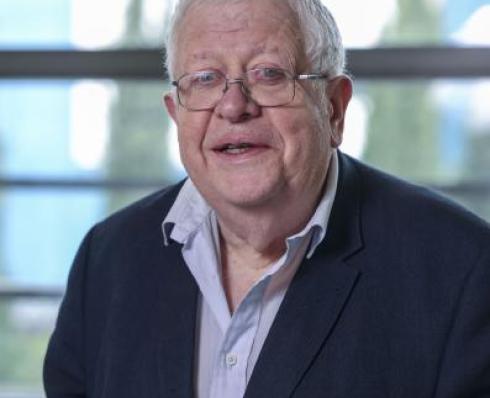
Martin Clynes is Emeritus Professor of Biotechnology at DCU. He joined DCU ( then NIHE Dublin) in 1981 and was part of the foundation team (with Owen Ward, Richard O’Kennedy, Alan Bunch, Graeme Walker and Firouz Darabi) which designed the first indergraduate degree in Biotechnology in Ireland, with first students graduating in 1986. He was Head of the School of Biological Sciences from 1986 to 1991. In 1987, he was appointed the first Director of the National Cell and Tissue Culture Centre, one of the initial three centres in the Irish Government’s first National Biotechnology Programme , Bioresearch Ireland (BRI). BRI, under the inspirational leadership of Barry McSweeney,played a major role in putting Ireland on the international biotechnology map providing the launching pad for Ireland's current position as a leading location of the Biopharma production industry.
Martin’s research has focused on cell biology, for example as applied to drug resistance in cancer ( which led to a successful clinical trial of a new patented drug combination, in collaboration with John Crown and Robert O’Connor; and establishing a radiobiology research laboratory at St Luke’s Hospital in collaboration with Fiona O’Neill and Radiation Oncologists. Michael Moriarty and Gerard McVey); The biology of the main Biopharma production cell line CHO ( in collaboration with Paula Meleady , Colin Clarke and Niall Barron)and culture of differentiated cells ( Which led to a successful clinical trial, developing an artificial cornea for transplant, in collaboration with Finbarr O’Sullivan and surgeon Billy Power at the Royal Victoria Eye and Ear hospital); and including a long collaboration, (jointly with Joanne Keenan and Finbarr O’Sullivan, )with Alltech on in vitro models for intestinal cells . His team also established several new human cancer cell lines, with tissue provided by clinical collaborator Vincent Lynch .Research funding came from SFI, E.I., HRB, EU, Irish and international Cancer charities, and industry. Led DCU’s successful PRTLI Cycle III NICB (National Institute for Cellular Biotechnology)application which funded research across many groups in DCU, NUIM and ITT and funded construction and equipping of a state of the art cell biology research building at DCU, opened in 2006.
Has had extensive collaboration with Irish and international industry, and in 1994 established a successful campus company, Archport Ltd, to provide GMP contract manufacture services to the then embryonic biopharma industry - this generated substantial funding for basic research at DCU , and trained dozens of young scientists in relevant expertise ; - many went on to staff at senior level the emerging Irish -based Biopharmaceutical production sector. The company was eventually sold to Uetikon Gmbh, becoming Biouetikon, the sale generating sufficient finance to pay off the loans DCU had taken out to construct the R&D building. Also was member of committees which charted plans for development of a National Biotechnology Industrial research and training Centre, which became NIBRT. In 2014 he was joint recipient of Nature’s senior award for mentoring of young scientists. Most of his publications can be accessed on PubMed by typing Clynes M Dublin, sorting by Publication Date
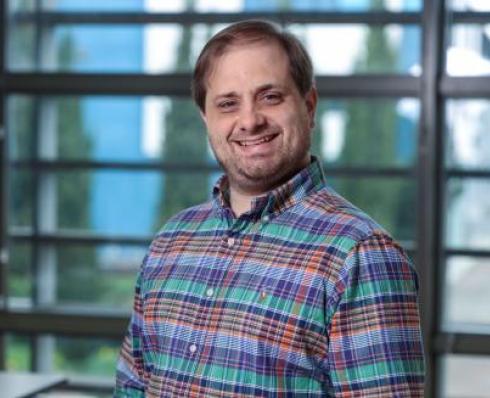
Denis Collins is an Assistant Professor in the School of Biotechnology, a DCU Life Sciences Institute member and Principal Investigator of the Cancer Biotherapeutics Research Group. Biotherapeutics (biologics or biotech drugs) are at the forefront of modern cancer chemotherapy. Examples include the monoclonal antibody trastuzumab, the antibody drug conjugate T-Dxd, and the immune checkpoint inhibitor pembrolizumab. The goal of the Cancer Biotherapeutics Research Group is to fully exploit the potential of biotherapeutics, alone or in combination with other drugs, to generate treatment option rationale for cancers with an unmet clinical need.
Denis completed his undergrad in Biochemistry at University College Cork and his PhD thesis on drug resistance in lung cancer at DCU. He has held an IRCSET Enterprise Partnership Scheme Postdoctoral Fellowship (the immune response to antibody therapies), a Roche Postdoctoral Fellowship (HER4 mutations) co-located between DCU and the Roche Innovation Center Munich, Germany and the Caroline Foundation Senior Research Fellowship in DCU. Denis is currently Co-PI on the Science Foundation Ireland Strategic Research Partnerships Programme Award ACORN, a member of the Irish Association for Cancer Research Senior Council and core group member of the IMMUNO-model COST Action.
Utilising cutting-edge laboratory techniques and unique 2D and 3D cancer models, the Cancer Biotherapeutics Research Group focusses on:
-
Understanding the interplay between biotherapeutics and the immune system to find new therapeutic targets or potential synergistic combinations
-
Determining the underlying mechanisms of innate and acquired resistance to biotherapeutics that limit the efficacy of these drugs in the clinic
-
Identifying patients that will most benefit from biotherapeutics through the analysis of patient-derived translational material from national and international clinical trials.

Dr Neil Conlon is the CCRT Stimson research fellow based in Dublin City University and a member of the Life Sciences Institute. Neil is group lead of the Breast and Gynaecological Oncology Targeted Therapies research group in DCU. The group aims to find new treatment options for breast and gynaecological cancers, using a comprehensive pre-clinical approach to investigate potential new treatments. The group also examines how drugs that are approved for other diseases can be repurposed to treat poor prognosis cancers. Key technical skills include kinetic fluorescent microscopy, adherent and 3D cancer modelling, and in vivo xenograft drug assessment.
Neil received a BSc (Double Hons.) in Biology and Chemistry from Maynooth University in 2013. Following this, he completed his PhD in Cancer Biology at DCU in 2018. His PhD examined the ways in which breast cancers can become resistant to HER2-targeted therapies. Neil conducted postdoctoral research in DCU funded by Puma Biotechnology and was then awarded an Irish Research Council Enterprise Partnership Scheme postdoctoral fellowship. In 2020, Neil received the EACR junior investigator award from the Irish Association for Cancer Research. His group has been funded through national exchequer funding, charity and industry partnerships. He is an IACR junior council member and management committee member for the COST Action Gynocare.
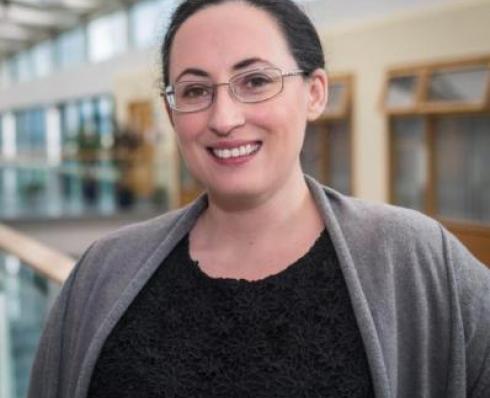
Dr Emma Coyle is an Assistant Professor in Organic and Medicinal Chemistry in the School of Chemical Sciences (SCS) and is currently the School Lead on the DCU Futures project. Her research interests are in organocatalysis and green (organic) chemistry.
Dr Coyle is a DCU graduate, with an undergraduate degree in Chemical and Pharmaceutical Sciences and doctorate in Green Photochemistry. She worked as a postdoctoral researcher in the University of Nottingham investigating immobilisation of catalysts, before returning to DCU for further postdoctoral research in catalytic reactions. She commenced a temporary lecturing position in DCU in 2014, and attained tenure in 2017. Her first doctoral student graduated in 2023.
The Coyle Group research themes focus on organocatalysis and orthogonal reactions and on synthesis of supramolecular molecules for green applications (e.g. treatment of waste water). These synthetic approaches have a range of potential applications, including preparation of novel small molecules as potential medicines or chemical sensors for disease detection.
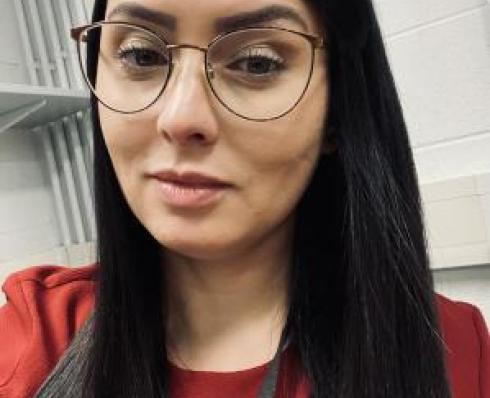
Loanda Cumba is an Assistant Professor (Chemistry with Artificial intelligence - DCU Futures Programme) in the School of Chemical Sciences at DCU. She received her MSc and PhD in Materials Science (Materials Chemistry) from the Sao Paulo State University, UNESP, Brazil, in 2012 and 2016, respectively. In 2014, she was awarded a prestigious grant from the Coordination for the Improvement of Higher Education Personnel (CAPES-Brazil) that allowed her to develop part of the PhD research programme at Manchester Metropolitan University (UK). In 2017, she moved to Ireland, where she worked as a Postdoctoral Fellow at DCU on a joint project between an industrial partner and DCU funded by Enterprise Ireland. It received the DCU Invent Commercialisation Award.
Cumba’s research interest lies in the development of novel strategies for the fabrication of 3D/4D printable multi-responsive (polymer and nano) materials to explore their attractive properties, versatility, and applicability not only as (bio)sensors platforms but also in the energy storage and conversion field. Her idea is to design intelligent data analysis methods that combine electrochemical sensing with machine learning (ML) to solve complicated, non-linear and dynamic problems in (bio)sensing and electrode development. Her research is focused on the development of multicomponent polymer-based conductive (bio)inks, sustainable materials and manufacturing, 3D/4D-printing technologies, smart 4D printed structures, advanced (bio)composite materials, low-temperature printing technology, post-printing bioactivity, machine learning for materials development, and design of intelligent data analysis.
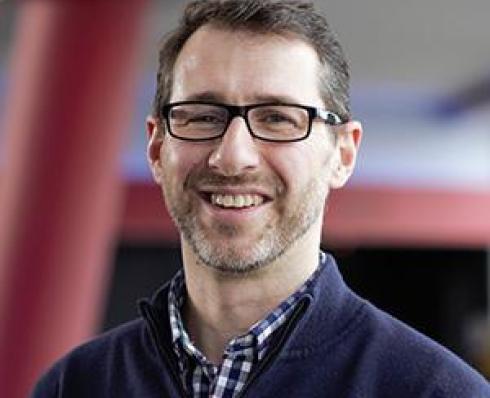
Professor Nicholas Dunne is a Full Professor of Biomaterials Engineering in the School of Mechanical and Manufacturing Engineering at DCU. He is a globally renowned biomaterials researcher with an exceptional track record of impactful and translational research outputs. His pioneering work at the interface of materials science, engineering, and biology has significantly contributed to developing innovative biomaterials for orthopaedics, cancer treatment, and wound management.
Prof. Dunne is an SFI-funded investigator within the SFI Centres for Advanced Materials and BioEngineering Research (AMBER) and Advanced Manufacturing (i-Form). To date, he has secured approximately €43 million in research funding from prestigious organisations such as the EU Commission, Engineering and Physical Sciences Research Council, Science Foundation Ireland, and major multinational BioPharma/MedTech companies. His research has resulted in over 250 peer-reviewed publications, 15 book chapters, and more than 550 presentations at national and international biomaterials conferences. Prof. Dunne has collaborated with Prof Helen McCarthy at Queen’s University Belfast in developing groundbreaking research on non-viral systems for nucleic acid and small molecule delivery that has led to the establishment of the spin-out company pHion Therapeutics, was received INVENT NI and All-Ireland Seedcorn awards for the most investable start-up in 2017. pHion Therapeutics has secured significant investment and is developing a pipeline of mRNA vaccines, including HPV, COVID-19, and ovarian cancer.
Prof. Dunne is the Founding Executive Director of Biodesign Europe, a joint appointment between DCU and Arizona State University. He leads a faculty of 80 Principal Investigators delivering a world-class transatlantic research program with over €30 million in research income and collaborations with 22 universities and 15 industry partners.
Prof. Dunne's exceptional contributions have been recognised with numerous prestigious awards, including the IMechE Duncan Dowson Award (2002), Journal of Materials Science: Materials in Medicine Award Best Paper Award (2007 and 2017), Institute of Materials, Minerals and Mining Best Paper Award (2008), Orthopaedic Research Society/British Orthopaedic Research Society Fellowship (2008), RAEng/Leverhulme Trust Senior Research Fellow Award (2010), the 2024 DCU President’s Award for Research Innovation, and his induction as a Fellow of the International Union of Societies for Biomaterials Science and Engineering (IUSBSE) during the World Biomaterial Congress (2024).
Prof Dunne has served in leadership roles for major international biomaterials organisations, including the European Society for Biomaterials Council (current President), the World Biomaterials Congress (Vice President and Treasurer of the Executive Organising Committee for WBC 2020), and the Royal Academy of Medicine in Ireland – Section of Bioengineering (President, 2019-2023).
An overview of Prof Dunne’s publication track record is available here.
For Prof Dunne's full profile, please see here.
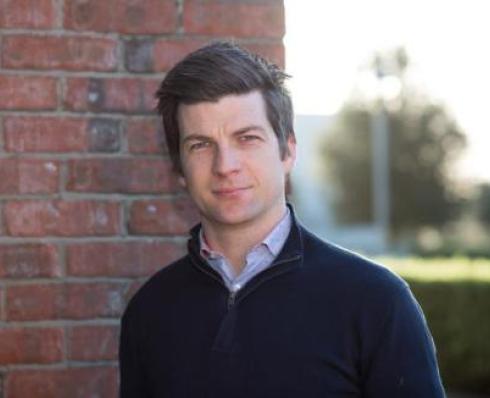
Brendan Egan is an Associate Professor of Sport and Exercise Physiology, and currently Head of School for the School of Health and Human Performance at DCU. His research investigates skeletal muscle function and adaptation across the life course, with special interest in the synergy between nutrition and exercise interventions ranging from athletes to older adults.
Brendan received his BSc Sport and Exercise Science from the University of Limerick in 2003, MSc Sport and Exercise Nutrition from Loughborough University in 2004, and PhD from Dublin City University in 2008, before completing two years of post-doctoral training with Prof. Juleen Zierath’s Integrative Physiology group at the Karolinska Institute, Sweden. His doctoral studies focussed on skeletal muscle adaptation to exercise, and in particular the continuity between acute molecular responses to individual bouts of exercise and adaptations induced by exercise training, whereas his post-doctoral training utilised animal models and in vitro cell systems to investigate the transcriptional regulation of skeletal muscle development and mechanisms of insulin resistance. As well as a Principal Investigator at the Life Sciences Institute at DCU, he is also a Visiting Research Scientist at the Florida Institute for Human and Machine Cognition, Pensacola, FL USA.
His research group performs human trials involving both acute and chronic interventions for outcomes around performance (physical and cognitive), recovery and adaptation, and have employed a wide range of experimental designs that are complimented by molecular analysis tools include transcriptomics, proteomics and metabolomics. His recent research has focussed on the effects of acute exercise and exercise training on exercise-responsive circulating factors including metabolites and extracellular vesicles, with specific interest in whether any of these factors demonstrate bioactivity that contributes to the adaptive responses or health benefits of exercise.
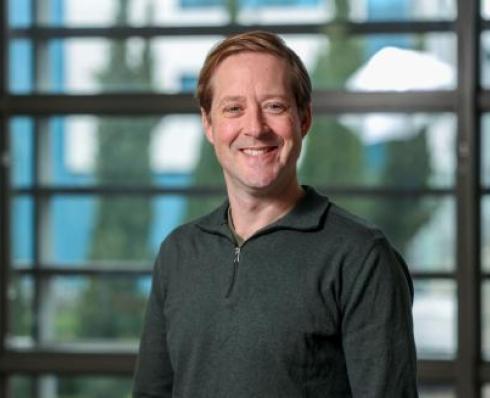
Alex J Eustace is an Assistant Professor in the School of Biotechnology and a Principal Investigator in the Life Sciences Institute in Dublin City University. The Eustace Research lab aims to understand the role of genomic alterations (both coding and non-coding) and identify their functional role in treatment response and resistance. The aim of the Eustace lab is to use this knowledge to improve treatment outcomes for those who suffer from cancer.
Dr Eustace completed his PhD in DCU in 2010 and started his Post-Doctoral studies under the guidance of Prof John Crown, as part of the SFI funded Research Cluster, Molecular Therapeutics for Cancer in Ireland. In 2012 Dr Eustace was a co-Applicant on a successful Health Research Award with Prof Bryan Hennessy and moved to the Royal College of Surgeons in Ireland. Dr Eustace held positions as Research Fellow and Senior Research Fellow in RCSI until 2017. In 2017 Prof Crown recruited Dr Eustace to lead his research team in DCU, Molecular Therapeutics for Cancer in Ireland. Dr Eustace was promoted to the role of Assistant Professor in 2021. Dr Eustace has received funding from both industrial and exchequer funding. He has received significant funding from the Health Research Board and was a PI on the SFI Infrastructure award AUTOPILOT. In recognition of Dr Eustace’s achievements, he was awarded the Royal Academy of Medicine in Ireland St. Luke’s Young Investigators Award in 2016.
Research from the Eustace lab has identified novel combinatorial approaches to treat patients with breast cancer and has led to the initiation of clinical trials in women with breast cancer. The lab continues to pursue novel treatment strategies to treat cancer but has interests in drug discovery and drug delivery systems. More recently the Eustace lab has focused on the identification of non-coding mutations in breast cancer. The group now aims to functionally determine the role of non-coding mutations in cancer and whether they represent novel treatment targets for cancer.
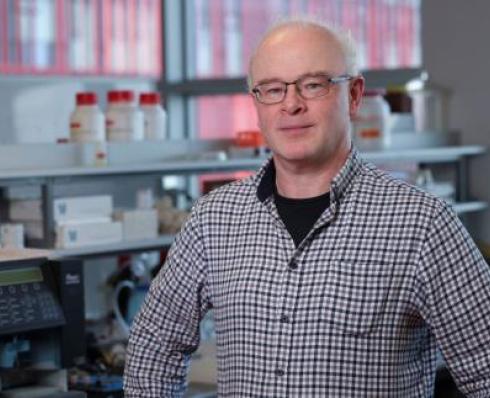
Dr Darren Fayne started as an Assistant Professor in Computational Chemistry in DCU in 2024. His Molecular Design Group (MDG) creates and applies computer-aided drug design technologies to discover and develop novel small molecules that modulate the activity of proteins involved in disease pathogenesis. Darren is an adjunct Assistant Professor in TCD, a member of the Irish Association of Cancer Researchers, the LSI, Irish Association of Pharmacologists, the American Chemical Society and a Fellow of the Institute of Chemistry of Ireland.
Darren holds a degree in Applied Chemistry and PhD in computational and organic chemistry from Dublin City University. He has an M.Ed. in Higher Education from Trinity College Dublin. He worked for two years at Solvay Pharmaceuticals in Hannover, Germany as a molecular designer from March 2003. While with the Computer-Aided Drug Design Group he focused on two main therapeutic areas of research: cardiovascular disease and gastroenterology (IBS/IBD). In July 2005 Darren joined the Molecular Design Group in Trinity College Dublin as a Senior Research Fellow. Darren has lead a number of successful small molecule hit-finding research programmes against various protein targets including – androgen receptor (AR), farnesoid X receptor (FXR), peroxisome proliferating activated receptor gamma (PPARγ), glucocorticoid receptor (GR), estrogen receptor α and β (ER), tubulin, caspase 6, macrophage migration inhibitory factor (MIF), toll-like receptor 4/myeloid differentiation 2 (TLR4/MD2), plasmepsins, IL-17, Viral infectivity factor (Vif), Lipoprotein signal peptidase (LspA), cytochrome P450, SARS-CoV-2 nsp3, SARS-CoV-2 nsp13, along with novel compounds demonstrating in vivo efficacy against malignant pleural mesothelioma, lung cancer and sepsis. In the late 2000’s, he co-founded and served as a director of a rational drug design campus spin-out company to commercialise intellectual property and develop compounds for the treatment of an orphan cancer – malignant pleural mesothelioma.
Darren is interested in meeting potential collaborators intent on discovering small molecules with the potential to treat disease.
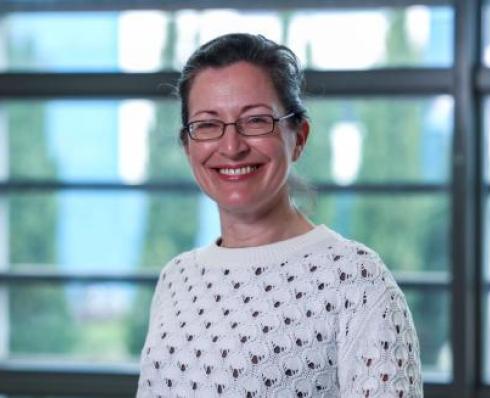
Emma Finlay is an Assistant Professor in the School of Biotechnology with research interests in the use of bioinformatics and statistical techniques in genomic analyses.
Emma’s undergraduate and postgraduate work in Trinity College Dublin focused on the population genetics of wild and domestic bovini, using mitochondrial sequences to identify demographic events in the past. After a brief time in the International Livestock Research Institute in Kenya she returned to Trinity and then Teagasc to work at the intersection of genetics and immunology. The availability of tuberculosis testing results on hundreds of daughters were used to generate phenotypes for a genome wide association study of bulls used in artificial insemination and targeted sequencing of innate immune defensins identified a haplotype associated with fertility.
Emma has worked in DCU since 2016, teaching at undergraduate and postgraduate levels on statistics and bioinformatics methods in computational biology and publishing with colleagues and external collaborators on fundamental and applied research. She has supported the bioinformatics work packages of such diverse projects as flow cytometry of CHO cells exposed to lectins, RNA sequencing of mice and S. aureus, ligand binding in Fasciola and Shistosoma, transmission disequilibrium testing of SNPs in trios, isoform identification from PacBio long read RNA sequencing, differential gene expression analysis of microarrays and RNA sequencing, linear discriminant analysis of photonic data, drug synergy analysis and ChIP seq analysis.
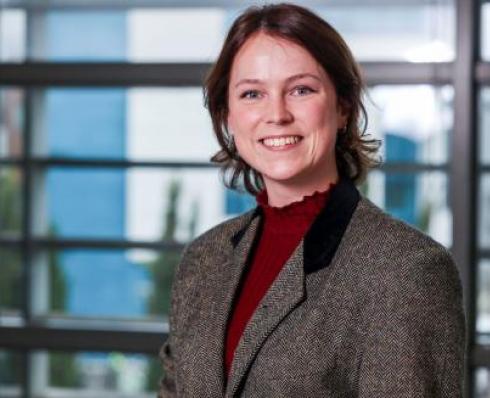
Aoife Fitzpatrick is an Assistant Professor in Cognitive Neuroscience in the School of Psychology and a member of the Life Science Institute at Dublin City University. Her main research focus is understanding the cognitive and neural mechanisms underpinning upper limb action specification, and translating these insights for clinical and therapeutic application. Aoife is currently a member of Neuroscience Ireland (NI) and the Psychological Society of Ireland (PSI).
Dr. Fitzpatrick is an early career researcher with extensive international experience. Before joining DCU in 2023, Aoife completed a post-doctoral fellowship at the Centre of Life, Nano, and Neuro Sciences (CLN2S) at the Italian Institute of Technology in Rome, Italy (IIT@Sapienza), leading an interdisciplinary research project in collaboration with the Department of Medicine and Surgery at the University of Parma. Aoife received her PhD from Bangor University, North Wales, where she also completed a Master’s programme in Clinical Neuropsychology.
Her recent research and publications have focused on the role of spatial proximity on the development of viable body-part-specific action representations. This work utilises a combination of state-of-the-art theoretical and experimental approaches, including high-density EEG and computational modelling in humans and intracranial electrophysiology in non-human primates. In parallel, Aoife is also investigating how to improve motoric functional outcomes in stroke survivors.
Read Dr. Fitzpatrick’s full profile including publications here
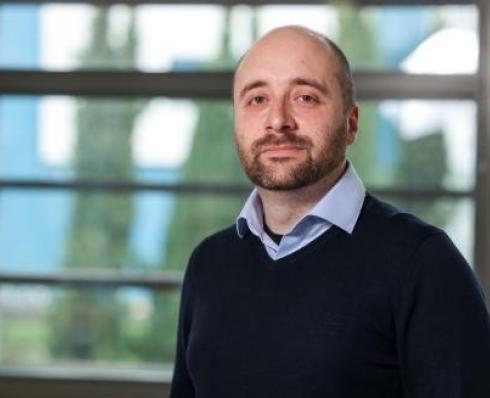
Achilleas Floudas is an Assistant Professor in Immunology in the School of Biotechnology and a member of the Life Sciences Institute. Achilleas is the Principal Investigator of the Translational Immunology Research Group which focuses on interdisciplinary studies utilising mechanistic immunology, bioinformatics and key collaborations with clinicians and patient partners in order to identify novel therapeutic targets of rheumatic, skin autoimmune diseases and cancer.
Achilleas completed his undergraduate studies in molecular biology at the University of Crete, Greece and the Norwegian University of Science and Technology (Norway), before receiving a PhD scholarship to study the role of B cells in Primary Biliary Cirrhosis from the Medical School of Newcastle University (UK). He received his PhD in 2014 and joined the translational immunology group in Trinity College Dulin to investigate the role of ILC in skin inflammation. Achilleas was awarded a 2-year Irish Research Council Postdoctoral fellowship before joining the Rheumatology department of Trinity College Dublin. For his subsequent work on B and T cell responses under hypoxia in patients with arthritis and the first studies in T cell polyfunctionality, Achilleas received the CARD Investigator fellowship (2020), the Dean’s Research Boost award (2022), the EULAR scientific abstract award (2022) and the prestigious HRB Emerging Investigator award (ranked 2nd nationally) (2022). In 2021, Achilleas was elected senior research fellow of TCD and in 2023 joined DCU as an Assistant Professor. To date, he has published several high-impact factor papers and received over 2 M euro in direct and indirect research funding.
Patients suffering from autoimmune disorders currently must undergo several rounds of exploratory treatments before the correct treatment is identified. The translational immunology lab currently has several PhD students, postdocs and undergraduate students working on different aspects of immunometabolism and autophagy under conditions that simulate chronic inflammation in order to identify novel approaches for targeted therapeutic intervention in arthritis and skin inflammation. By changing the balance and finetuning molecular pathways that affect the function and fitness of T cells and macrophages at sites of chronic inflammation and cancer we may be able to alter immune responses depending on the needs of the individual patient.
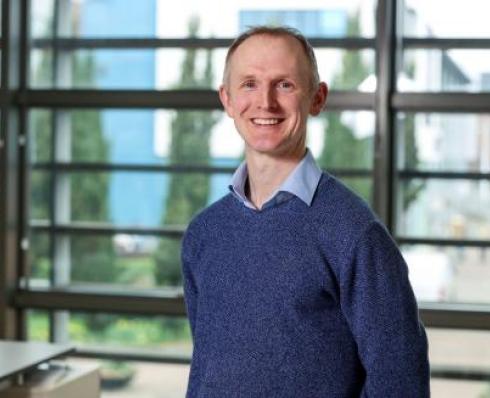
Michael Freeley is an Associate Professor in the School of Biotechnology and a member of the DCU Life Science Institute (LSI). As Principal Investigator of the T-cell Signalling laboratory, Michael’s research focuses on the molecular mechanisms of T-cell activation and migration and how these signalling pathways can be manipulated for the treatment of inflammatory diseases and cancer.
Michael obtained his BSc in Biotechnology from the School of Biotechnology in DCU (First class honours) and subsequently undertook a PhD in Immunology in the Royal College of Surgeons in Ireland (RCSI) under the supervision of Professor Aideen Long. His PhD thesis studied the role of Protein Kinase C phosphorylation in in T-cell signalling. He subsequently worked as a Postdoctoral Scientist at RCSI for two years before moving to Trinity College Dublin (TCD) to work as a Research Fellow with Professor Dermot Kelleher and Prof Aideen Long where his research on T-cell activation and migration continued. He was promoted to Senior Research Fellow at TCD before being recruited back to DCU in 2016 to take up the position of Lecturer in Biomedical Sciences where he also set up his current research laboratory. Michael was promoted to Assistant Professor in Precision Medicine in 2019 (Permanent post) and was promoted to Associate Professor in 2023.
The Freeley laboratory aims to understand the molecular basis of T-cell-driven inflammatory diseases including Atopic Dermatitis, Inflammatory Bowel Disease and Multiple Sclerosis and how this knowledge could be used to develop therapeutic strategies to block T-cell function. This has led to successful collaborations and funding awards from the internationally-recognised pharmaceutical company Almirall (who investigate inflammatory skin diseases including Atopic Dermatitis) and Atomwise (San Francisco) who in collaboration with the Freeley lab developed and screened a library of small molecule compounds through Atomwise’s proprietary AI drug screening technology to target an intracellular protein complex that plays an important role in T-cell activation and migration into the Central Nervous System (a pathological cause of Multiple Sclerosis). In addition, the Freeley lab is looking at new ways in which to genetically engineer T-cells so that they can recognise cancer cells and this work is currently funded through the Irish Research Council in collaboration with pHion Therapeutics and Prof. Helen McCarthy at Queen’s University Belfast.
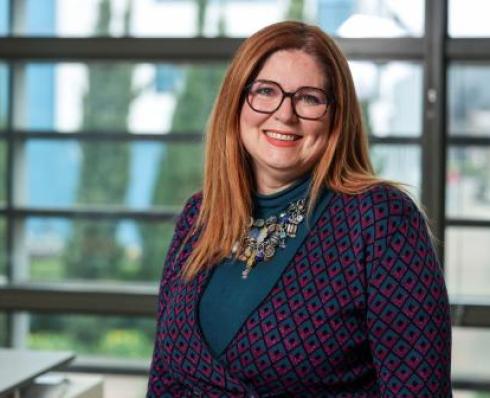
Silvia Giordani is Professor Chair of Nanomaterials in the School of Chemical Sciences at Dublin City University. As Principal Investigator of the Giordani Laboratory and LSI member, her research interests are in the design, synthesis, and characterization of a wide range of nanomaterials for applications in smart and responsive bio-related nanotechnologies.
Silvia received her PhD in Chemistry from the University of Miami, USA and carried out postdoctoral research at Trinity College Dublin (TCD), Ireland and at the University of Trieste, Italy. In 2007 she received the prestigious President of Ireland Young Researcher Award and was a Research Assistant Professor at TCD from 2007 to 2013. In September 2013 she founded the new “Nano Carbon Materials” research lab at the Istituto Italiano di Tecnologia (IIT) and in December 2016 she was appointed Associate Professor in Organic Chemistry at the University of Turin, Italy.
Silvia has held the Head of School role at DCU from 2020 to 2023.
Recent research and publications from the Giordani group have focused on the development of novel drug delivery systems based on carbon nanoparticles for cancer therapy.
She has authored over 150 peer-reviewed publications in International journals from 2001 to date that collectively have received over 9,000 citations. She has also presented her work at numerous conferences around the world e.g. in United States, Canada, Japan, New Zealand, India, Saudi Arabia, Argentina, Brazil, Chile and across most of Europe. She is Associate Editor for Beilstein Journal of Nanotechnology and for Frontiers in Chemistry - Supramolecular Chemistry.
Read Prof Giordani’s full profile including publications here
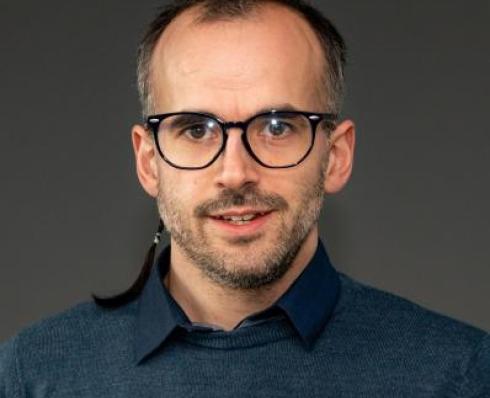
Konstantinos Grintzalis is an Assistant Professor in Biochemistry in the School of Biotechnology and a member of the Life Sciences Institute. Konstantinos is the Principal Investigator of the Molecular Toxicology Research Group which focuses on the underlying mechanisms of pollutants in a wide range of model systems. With key collaborations with clinicians, environmental research institutes and universities, he translates molecular knowledge into novel sensitive metrics for pollution assessment with the ultimate goal to safeguard and predict pollution early.
Konstantinos completed his undergraduate and postgraduate studies in the department of Biology of the University of Patras, Greece and following he was a postdoctoral researcher in the Institute of Chemical Engineering in Patras working in the field of Systems Biology. Following, he joined the Université catholique de Louvain and studied the toxicity mechanisms of silver nanoparticles on cell model systems. In 2015 he moved to the School of Biosciences in the University of Birmingham where he worked with pioneers in environmental metabolomics and effectively how molecular signatures can be used to safeguard the environment. Konstantinos joined DCU in 2017 and was awarded a Starting Investigator Research Grant from Science Foundation Ireland and secured additional funding from the Irish Research Council. To date, he has published high-impact factor papers and received over one million euro in direct and indirect research funding. His extrovert character is highlighted with collaborations with leading institutions abroad such as the Helmholtz Center for Environmental Research where he is a visiting researcher funded by the Alexander von Humboldt Foundation.
Considering that pollution is now responsible for more deaths than diseases such as malaria, tuberculosis and AIDS combined, the emphasis of safeguarding the environment is critical. Traditional monitoring approaches being restricted by their detection limits, fail to produce mechanistic or predictive insight as the rely more on analytical chemistry and detection of pollutants. As such hey are now even more supported by novel approach methodologies which bridge this gap with sensitive metrics. Among the species of interest, daphnids are important sentinel species which are ecoresponsive and provide molecular information upon exposure to pollutants. Using high throughput molecular techniques and a state-of-the-art culturing facility, daphnids become the equivalent of a “canary in the coal mine” to predict and understand pollution.
Read more about Konstantinos' research including his publications here.
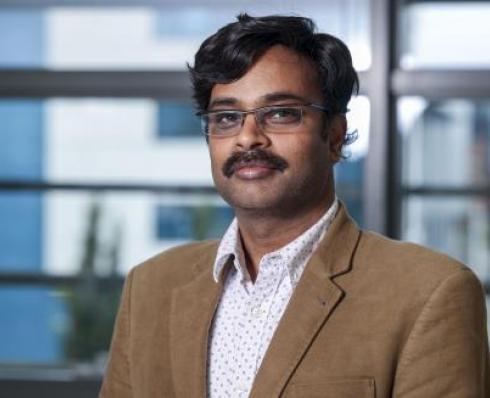
Vijai Kumar Gupta is an Associate Professor in the School of Biotechnology at DCU. His research interests include Biomass valorisation, Microbial engineering biotechnologies, Functional microbiomes, Advanced bioprocessing & fermentation technologies, and Bioactive natural products. Before joining DCU in January 2024, Vijai worked as a Senior Fellow and Group Leader at the Biorefining and Advanced Material Research Centre & Centre for Safe and Improved Foods at SRUC, Edinburgh, UK.
Following his PhD in 2009, Vijai has worked at various national and international universities, including MITS University, India; University of Galway, Ireland; Tallinn Technical University and Estonian University of Life Science, Estonia; UM6P Morocco; and SRUC, UK. He is a Fellow of a few international academies and societies, including Linnaean Society, UK; Mycological Society of India; Academy of Microbiological Sciences, India; and National Academy of Agricultural Sciences, India.
Vijai aims to lead research into biorefining, sustainable, and advanced biomaterials, understanding how synthesis, composition, and macromolecular design affect the overall properties. His current research focuses on developing engineering biology and bioprocess technologies for the synthesis, characterization, and applications of polymers, biochemicals, and biomaterials from renewable resources; utilization of waste materials; biofuels and functional biobased products; recycling; smart packaging materials/bioleather; biocomposites & bioresin; and biobased nanomaterials. His research vision is to engineer effective and affordable next-generation materials and bioproducts for agriculture, biomedical, and biomanufacturing, contributing to a sustainable bioeconomy.
Read Vijai Kumar Gupta’s full profile, including publications here

Denise Harold is an Assistant Professor in Genomics at the School of Biotechnology in DCU.
Her research focuses on the genetic epidemiology of human complex traits, which is crucial to understanding the molecular pathogenesis of these disorders and determining potential therapeutic targets.
Denise completed her PhD and postdoctoral research at Cardiff University, where she played a key role in several genome-wide association studies and sequencing studies of Alzheimer's disease, which successfully identified several risk loci for the disease. She has also worked on Huntington's disease, identifying genetic modifiers influencing age at onset of motor symptoms. Subsequent postdoctoral research at Trinity College Dublin involved identity-by-descent mapping approaches to identifying susceptibility variants for schizophrenia.
Denise's current research at DCU aims to understand the commonalities in aetiology of age-related chronic diseases, particularly regarding the role of mitochondrial genetic variation. Given her expertise in genomics and the multidisciplinary environment at DCU, she is also open to collaborating on projects outside of her own area, and has for example contributed to studies on the relationship between mitochondrial DNA heteroplasmy and one-carbon metabolism; transcriptomic responses to Fasciola hepatica infection; gene expression profiling of aquatic invertebrates exposed to pharmaceuticals.
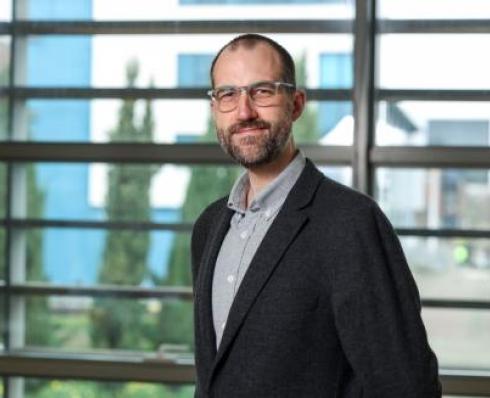
Janosch Heller is an Irish Research Council Laureate and Assistant Professor of Biomedical Sciences in the School of Biotechnology at DCU. Additionally, Janosch is an Honorary Lecturer at University College London Queen Square Institute of Neurology, UK. As Principal Investigator and LSI member, his research focusses on astrocytes and brain waste clearance as therapeutic targets in neurological diseases.
Janosch has worked in Neuroscience for over 15 years. He obtained a Diplom in Biology with a focus on Biochemistry, Genetics and Organic Chemistry from the University of Cologne, Germany before moving to the UK in 2009. There, he completed a PhD in Clinical Neurosciences under the supervision of Prof James Fawcett and Prof Keith Martin at the University of Cambridge. His research focused on activating integrins as therapeutic strategy in spinal cord injury and age-related macular degeneration. Afterwards, Janosch moved to the Queen Square Institute of Neurology at University College London, UK as a Research Associate to work with Prof Dmitri Rusakov. He was the first to establish single molecule localisation microscopy at the Institute and investigated the nano-environment of tripartite synapses. In 2018, Janosch joined the Royal College of Surgeons in Ireland and the SFI Research Centre FutureNeuro as a Marie Skłodowska-Curie Fellow. His project AstroMiRimage aimed at deciphering microRNA control of local translation in astrocytic processes in epilepsy. In 2020, Janosch moved to the School of Biotechnology at DCU to start his independent research group. He has been International Convenor for the School, continues to sit on several committees, including the EDI Committee, and is programme chair of the MSc in Biotherapeutics.
Recent research from the Heller group has focused on several streams of investigation: (1) Deciphering the role of the brain’s waste clearance system as an underlying mechanism of pathophysiology in neurological diseases using advanced microscopy, including super-resolution microscopy techniques stimulated emission depletion microscopy (STED) and single-molecule localisation microscopy (SMLM); (2) Assessing the role of extracellular vesicles as biomarkers of disease and carriers of therapeutics at the neurovascular unit; and (3) Creating novel in vitro models of the blood-brain barrier and the glymphatic system to test novel treatment options for neurological diseases in a pre-clinical setting.
Read Janosch Heller’s full profile including publications here
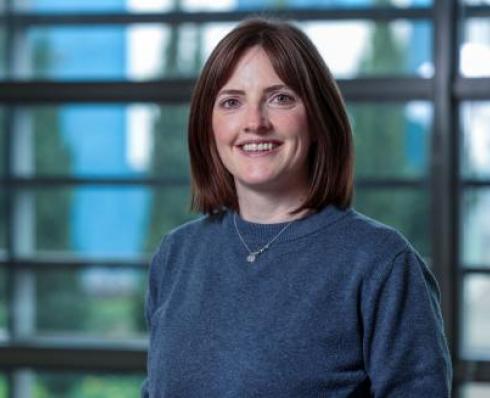
Dr. Linda Holland is an Assistant Professor in Microbiology at the School of Biotechnology, DCU.
Linda completed her undergraduate in Microbiology in University College Cork. Following this she received IRCSET funding to complete her PhD in University College Dublin where she studied biofilm regulation of the bacterial pathogen Staphylococcus epidermidis. She continued her research in pathogenic biofilm regulation during her post-doctoral fellowship with Prof Geraldine Butler at UCD. Here she focussed on biofilm formation of the emerging fungal pathogen Candida parapsilosis. In 2013, Dr. Holland was awarded a prestigious IRC-Marie Curie ELEVATE post-doctoral award. This allowed Dr. Holland to continue her research in fungal genomics at the University of Melbourne, Australia and UCD.
In 2016 Dr Holland established her own research group at DCU with a focus on polymicrobial biofilm infections. Linda was awarded a Wellcome Trust Seed Award to investigate the interactions that occur between Staphylococcus aureus and Candida parapsilosis during polymicrobial biofilm formation. Her current research is focused on establishing an ex vivo wound infection model to study host-pathogen interactions, novel treatments and diagnostic methodologies.

Dr. Seán Jordan is Associate Professor in the School of Chemical Sciences at Dublin City University. He is a leading researcher in the fields of geobiology, astrobiology, and the origins of life. As the Principal Investigator of the ProtoSigns Lab at DCU, he spearheads pioneering investigations into fundamental questions surrounding the emergence and evolution of life on Earth. He is currently a member of the LSI, the Science Foundation Ireland (SFI) Research Centres iCRAG and ADAPT, as well as the Origin of Life Early-career Network (OoLEN).
Seán obtained his BSc (Hons) in Environmental Science from DCU in 2009. Following this he gained practical experience as a research assistant in the National Centre for Sensor Research. In 2012, after a short time in Australia, he returned to DCU to complete his PhD in Biogeochemistry which was awarded in 2016. That same year he accepted a position as Postdoctoral Research Associate at University College London, investigating the first cell membranes at the origin of life. In 2021 he secured a ‘la Caixa’ Foundation Postdoctoral Junior Leader Fellowship (Marie Skłodowska-Curie COFUND) to pursue his work on protocells, organic biomorphs, and biosignature detection at Instituto Superior Técnico in Lisbon, Portugal. He then joined DCU as an academic in 2023.
Seán’s research is driven by a multidisciplinary strategy that integrates novel experimental approaches, state-of-the-art analytical techniques, and computational modelling to elucidate the complex processes that shaped early life and early Earth environments. His work delves into key aspects of prebiotic chemistry, exploring the formation of protobiomolecules and protocellular structures under plausible primordial conditions. A recipient of prestigious funding awards, including the SFI Pathway award and the European Research Council Starting Grant, Seán leads a dynamic research group focused on understanding life's origins, evolution, and existence. Through innovative experimental techniques and field expeditions to geologically significant sites, the ProtoSigns Lab is focused on pushing the boundaries of prebiotic chemistry at the origin of life, investigating how the resulting structures may be preserved in the rock record, and the potential effects this may have on our interpretation of biosignatures from the early Earth and elsewhere in our Solar System.
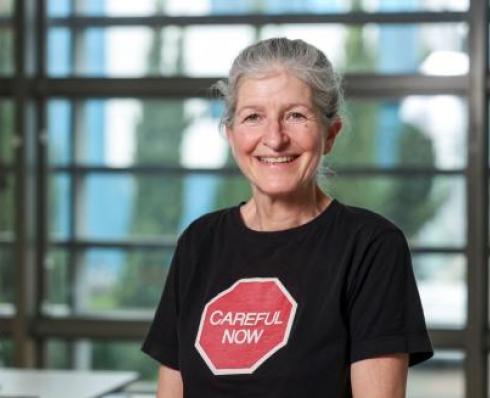
Joanne Keenan is a senior Research Scientist formally of the NICB and now a member of DCU Life Sciences Institute. Her current research interests focus on the role of micronutrients (copper, iron, zinc) on the intestine. Using simulated in vitro digestion models in conjunction with in vitro intestinal models of the small intestine to better model in vivo processes, organic formulations of these metals are compared to inorganic sources in relation to uptake and transport, and their impact on a cellular processes.
Joanne has worked for more than 30 years in mammalian cell culture and molecular biology in conjunction with Professor Martin Clynes. Early work focused on using proteomic techniques to identify differentially expressed proteins related to drug resistance in lung cancer (PMID: 19242932). Further work involved the identification of factors involved in anoikis, an early stage in the metastatic process of cancer (PMID:22281030). During this time, there has been a variety of projects including research collaborations with Maynooth and the RCSI. There has also been several industrial collaborations with successful out comes in either knowledge generation or publications.
Recent research publications have focused the impact of copper (inorganic and inorganic forms) on intestinal cells, detailing the relevance of autophagy and the unfolded protein response to varying sources of copper (PMID:30510751). Based on work in her group, an inflection point was observed where a lower concentration of copper was more toxic than a higher concentration (PMID:30798514). Employing proteomic analysis, several proteins with protective functions were found to be induced at an earlier time point, allowing cells in the higher concentration of copper to survive better (PMID:33559028).
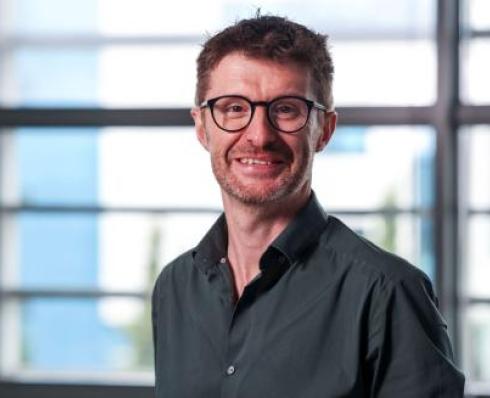
Nigel Kent is an Assistant Professor of Mechatronic Engineering and deputy head of the School of Mechanical and Manufacturing Engineering in DCU. As LSI member his research interests lie in the areas of the development of next generation sensors and companion instrumentation for environmental contamination and pathogen detection.
Nigel has worked in sensor development for over 20 years as a researcher with both the National Centre for Sensor Research and the Biomedical Diagnostics Institute. Through a joint collaboration with DCU and the Royal College of Surgeons of Ireland he was awarded his doctorate in the area of biomedical diagnostics for cardiovascular disease.
He then moved to the Dublin Institute of Technology (now TU Dublin) and became a member of the biomedical and assistive technologies research group in the Institute. In 2015/2016 he was seconded from the Dublin Institute of Technology to return to DCU as Senior Research Fellow in the areas of environmental sensing and additive manufacturing.
In 2018 he moved to the Institute of Technology Carlow (now SETU) where he became director of engineering research for the Institute. In 2021 Nigel returned to DCU and was appointed deputy Head of School in February 2024.
Recent research and publications from Nigel and his colleagues have focussed on the development of wireless power transfer to enable measurement from lab on a disk platforms under rotation. Nigel also has a number of current projects in the area of environmental monitoring, particularly water quality monitoring, where current projects are focussed on detection of Phosphate, E.coli and Dissolved Organic Carbon measurement. His research is interests are primarily application focussed where instruments and sensors he developed are designed with the end user and use case in mind. To that end, diagnostic systems he has developed have been tested in hospitals across the UK and Ireland while autonomous systems he has developed have been trialled in field locations across the US and Ireland.
Dr Kent’s full profile including publications may be found here

Nessan Kerrigan is an Assistant Professor in Organic Chemistry in the School of Chemical Sciences and the current chair of the Chemical and Pharmaceutical Sciences BSc Programme. His research interests are broadly in the development of new synthetic technologies for the efficient assembly of small pharmaceutical molecules and molecules of biomedical interest. The methods typically involve the use of various catalysts (organocatalysts, Lewis acids and transition metals), working separately or in concert, to provide more efficient and more selective routes to a diverse range of biologically active molecules.
Nessan has worked in synthetic organic chemistry research for >25 years. He obtained his B.Sc. in Chemistry from University College Dublin in 1996. He then completed his PhD in Chemistry at University College Dublin (1996-2000) under the direction of Professor Declan G. Gilheany. He spent a year in industry working as a process development chemist for Merck in Ballydine Co. Tipperary, before carrying out postdoctoral research on the use of samarium iodide for the synthesis of gamma-lactones at the University of Glasgow (2002-2004) with Professor David J. Procter. Next, he carried out postdoctoral work on the development of new [3,3]-sigmatropic rearrangements at the University of Pittsburgh (2004-2006) with Prof Scott G. Nelson. Nessan began his independent research career in 2006 as an Assistant Professor at Oakland University in Michigan and then moved to DCU in 2017.
Recent research from the Kerrigan group has focused on the development of a new method for the synthesis of nucleoside analogues, which is anticipated to provide a more efficient route to a broad range of antiviral and anticancer pharmaceuticals. The new nucleoside analogues will also be investigated, in collaboration with Prof Kellett’s group, in applications of novel 2’-modified nucleoside-derived Triplex Forming Oligonucleotides (TFOs) as part of a gene therapy strategy (e.g. for cancer treatment). Other areas of interest include prostaglandin analogue synthesis, tuberculosis metabolite/biomarker synthesis and the development of new antibiotics.
Dr Kerrigan’s full profile including publications may be found here
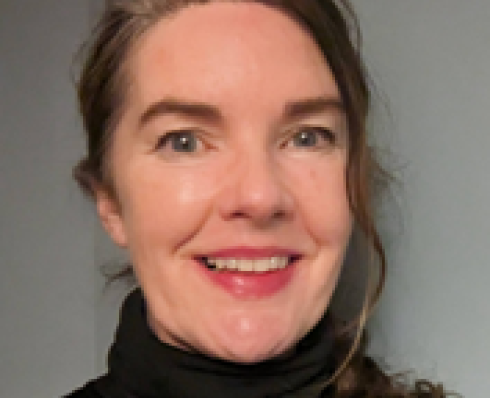
Tia Keyes is a full professor (chair) of physical chemistry based in the School of Chemical Sciences at DCU. Following her primary degree at TUD, and a year in industry, Tia completed her PhD in Physical Inorganic Chemistry DCU, then worked as a postdoctoral research fellow University of Manchester, UK, before returning to Ireland to work as a postdoctoral fellow on an EU project with periods spent in Belfast and Sweden. She took up a lectureship in physical chemistry at TUD in 1998 and moved to DCU in 2002 as lecturer before being promoted to full professor in 2014.
Tia’s research interests lie in the field of molecular spectroscopy and photophysics and in supramolecular & interfacial chemistry. She leads a multidisciplinary research team whose focus is on the applications of these fields to solution of biological and biophysical problems. Current projects focus on development of metallocomplex luminophores for cell imaging/environmental mapping, and phototherapeutics; And in microfluidic and plasmonic biomembrane systems for understanding drug membrane permeation and in disease diagnostics.
Tia is author/co-author of over 230 peer-reviewed journal publications. She also holds two international patents on biophysical platform Memsense. She has supervised/co-supervised 38 PhDs to completion to date.
Tia is a Fellow of the Royal Society of Chemistry and a Fellow of the Institute of Chemistry of Ireland. She is recipient of the President's prize for research and The Boyle Higgins Gold Medal and Lecture Award (2024).
Click here for more information on Keyes research group activities.
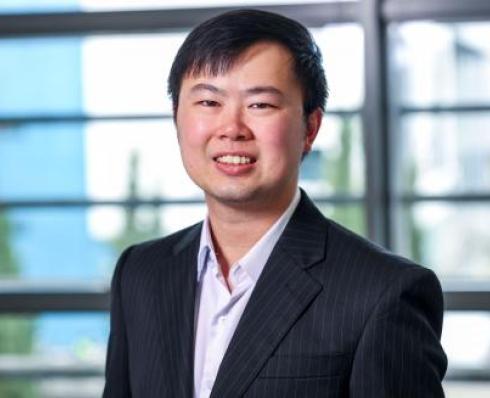
Dr Antony Kho is Assistant Professor of Biomedical Engineering in the School of Mechanical and Manufacturing Engineering at Dublin City University (DCU). As a member of DCU Life Sciences Institute (LSI), his research interests include but are not limited to soft tissue biomechanics (skin, liver etc.), biomaterials, medical devices (thermal ablation techniques, drug delivery etc.) and imaging modalities (ultrasound, micro-CT, particle imaging velocimetry etc.).
Prior to this, Dr Kho obtained his MEng degree in Mechanical Engineering with First Class Honours from University of Nottingham Malaysia in 2017. He then pursued his PhD in computational modelling of saline-infused radiofrequency ablation at Monash University Malaysia and was awarded his doctorate degree in 2021. After that, Dr Kho joined University College Dublin (UCD) as a Postdoctoral Researcher from 2022 to 2023, collaborating with both I-Form and BD Medical (Becton, Dickinson and Company), in which his research was focused on developing computational and experimental tissue models for the optimisation of subcutaneous drug delivery devices.
Dr Kho’s research in the development of computational and experimental tissue models aligns well with LSI’s aim to push forward the research of life science. His group is moving on to develop more biofidelic tissue models for various applications, which have demonstrated to be valuable tools in optimising medical devices. In parallel, his group is also studying the use of different imaging modalities for relevant applications.
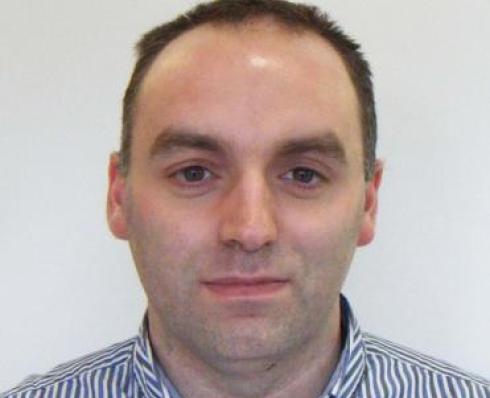
Dr David Kinahan is an Assistant Professor in the School of Mechanical and Manufacturing Engineering. David completed a BEng in Aeronautical Engineering (2003) and a PhD (2008) at University of Limerick (UL). His PhD focused on high-throughput droplet microfluidics for DNA analysis. In late 2007 David joined Stokes Bio Ltd, a spin-out from UL, as a Senior Engineer, and was later promoted to Engineering Manager leading a team of 10 engineers. David did post-doctoral research from 2012 to 2018 in DCU before moving to his current position. David’s research applies microfluidics to a wide range of areas including human health (HIV diagnostics, CTC detection, CVD diagnostics, liver disease, early detection of bacterial meningitis) and point-of-use testing (plant pathogen detection, environmental monitoring etc).
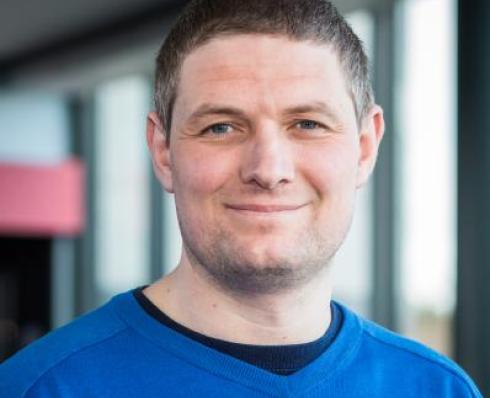
Dr. Damien King is an Assistant Professor in the School of Biotechnology focusing on modules in the field of Bioprocess Engineering. His research interests focus on microfluidic cell handling platforms (lab on a chip and lab on disc) including single cell analysis devices, cell enrichment techniques, cell line development applications, 2D & 3D cultivation devices and the system integration of microfluidic and bio-photonic techniques. Recently funded projects have also focussed on the application of microfluidic systems as process analytical technology (PAT) for upstream processing in biopharmaceutical production and bioprocessing and the role played by extracellular vesicles as both therapeutic and diagnostic tools. His research projects to date have been funded by Enterprise Ireland, Horizon Europe, Ireland – UK research collaborations and direct contract research with industry partners.
He completed a BEng degree in Electronic Engineering (2001) and a PhD (2005) in the Electronic and Computer Engineering (ECE) Department at the University of Limerick (UL). His PhD thesis focused on the application of Artificial Neural Network pattern recognition techniques to developed optical fibre sensor systems deployed for environmental monitoring applications.
In 2006 he took up a role as postdoctoral researcher with the Stokes Institute in UL working on an Enterprise Ireland Commercialization Fund project developing optical fibre sensor systems for strain monitoring applications on buildings and structures. Upon completion of his postdoctoral role in 2008, he joined Stokes Bio Ltd. - a spin out company from UL. The company was acquired by Life Technologies in 2010 and he worked within the R&D group as a Senior Systems Engineer.
In 2012 he joined the Microfluidics Platforms Research Group in School of Physics, DCU and worked as a Research Fellow in the development of microfluidic systems for single cell analysis applications (cardiovascular disease, cancer assays, cell line development, optofluidic integration). This work fed into the establishment of the Fraunhofer Project Centre for Embedded Bioanalytical Systems at DCU (FPC@DCU) in 2017 where he worked as Principal Investigator for the Cell Handling Applications Group within the centre. He then joined the School of Biotechnology in September 2022, where his research focus is on life science applications of microfabrication techniques and microfluidic systems.
Click here to view Damien's full profile including publications.
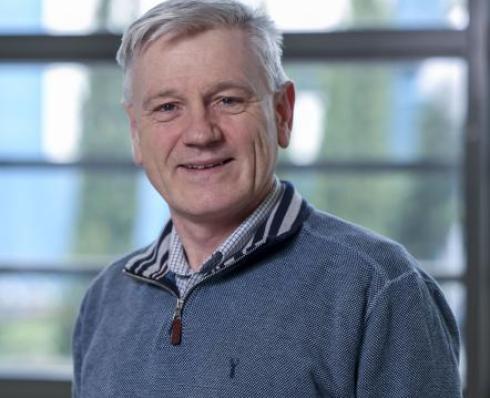
Dr Gary Lawrence is Assistant Professor of Molecular Neurobiology in the School of Biotechnology at Dublin City University. His research interests are in functional neurobiology as it relates to human health, with a particular focus on the use of neurotoxins to elucidate nervous system function and as therapeutics for the treatment of a wide range of peripheral neuropathologies.
Gary has worked in Molecular Neurobiology for over 25 years. He studied for his doctorate degree at Imperial College London, where he investigated the role of SNAREs in the catalysis of Ca2+ regulated transmitter release from neuroendocrine cells. During a subsequent post-doctoral period in Imperial College he discovered that botulinum neurotoxin type C cleaves SNAP-25 as well as syntaxin, the first example of a botulinum protease cleaving more than one SNARE. Gary joined DCU as a Research Lecturer when Prof. Oliver Dolly established the International Centre for Neurotherapeutics in 2003, before entering the School of Biotechnology as an Assistant Professor in 2023.
Gary continues to investigate the effects of botulinum neurotoxins on various divisions of the peripheral nervous system in vitro and in vivo, ranging from skeletal muscle motor neurons to sympathetic nerves, parasympathetic nerves, and the sensory neurons involved in sensation and pain. His research encompasses the effects of botulinum neurotoxins on diverse processes, including synaptic neurotransmission, neuropeptide exocytosis, membrane protein trafficking and axonal growth. Recent research and publications from the Lawrence group have focused on how transient receptor potential (TRP) channels encode pain-related signal intensity, and the role of membrane trafficking of TRP channels in the sensitisation of pain signalling nociceptor neurons by neurotrophins that are released at sites of injury, inflammation, or diseases such as cancer.
Assistant Prof Lawrence’s full profile including publications may be found here.
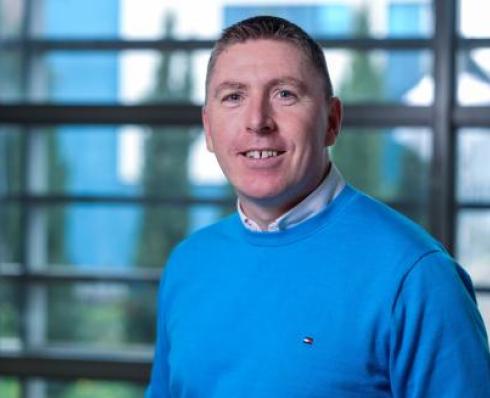
Dr Paul Leonard is an associate Professor in Biotherapeutics at Dublin City University (DCU) leading research in biomolecular interaction analysis, immunoassay development, technology development, single cell analysis, biologics discovery and diagnostics across multiple biomedical and environmental application areas.
Paul is an innovative entrepreneur and technology inventor with over 20 year’s post Ph.D. experience in academic and industrial research and senior management roles in clinical and pre-clinical stage companies. He is a co-founder and previous CSO/CTO of Remedy Biologics Ltd. Based on technology invented in his lab, Paul spun the company out of Dublin City University, raising >€15M in non-dilutive and equity-based financing. He also led the development of partnership deals with big pharma, academic and clinical institutions. Paul is also a previous director and head of R&D at Vaccinogen Ireland responsible for leading the Company’s overall cancer therapeutics strategy in Ireland. He has also been a consultant to the life sciences industry including holding roles as advisor to senior management, entrepreneur in residence, scientific and business strategy advisor, IP and technical expert.
Paul has a broad multidisciplinary experience in both academic and industrial research programme management, including combining innovation in biomedical platform development with novel approaches for analysing human cell biology at the single cell level. He has a strong record in translating early-stage research into commercial utility including IPR asset management. His team continue to develop technologies and assays for biomedical and environmental applications.
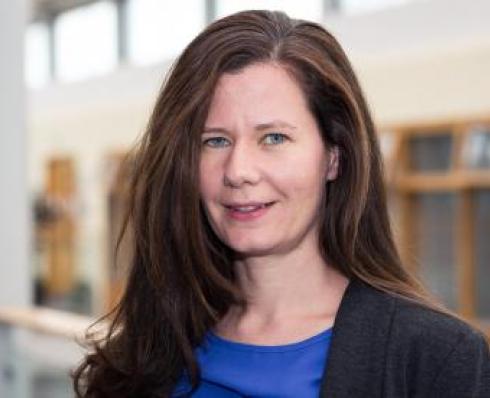
Tanya Levingstone is Associate Professor in the Biomedical Engineering in the School of Mechanical and Manufacturing Engineering, DCU. She is the Assistant Director of the Advanced Processing Technologies Centre in DCU, a member of DCU Bio-design Europe Institute, a funded investigator within I-Form and a member of both the Centre for Doctoral Training in Advanced Metallic Systems (CDT-AMT) and SFI Centre for Research Training in Artificial Intelligence (CRT-AI). She completed her PhD in the National Centre for Plasma Science and Technology (NCPST) in DCU. Her Postdoctoral research, carried out in the RCSI, focussed on cartilage tissue engineering. She now leads a biomaterials/tissue engineering research group in DCU.
Dr Levingstone’s research programme lies in the areas of bioengineering, material science, natural and synthetic biomaterials and tissue engineering. She leads a multidisciplinary research group that is focussed on the development of new bioengineering approaches to existing healthcare challenges with the overall aim of achieving improvements in population health. This research is focused on the development of new therapeutic biomaterials for orthopaedic applications and novel biomaterial-based 3D model systems to aid in understanding disease progression. Her work in this area has a strong translational focus and has led to the successful licencing of a novel scaffold for osteochondral defect repair and demonstration of its safety in a preliminary clinical trial. This research has been developed through strong clinical and industrial collaborations.
Read Tanya Levingstone’s full profile including publications here

Christine Loscher is a Full Professor of Immunology and currently the Head of School of the School of Biotechnology at DCU. She leads the Immunomodulation Research Group which has a focus on translating how modulation of the immune response has health benefits. Her focus includes discovering new anti-inflammatory/anti-allergic compounds and ingredients that can be used in the pharma and food industry. She is a Principal Investigator in the Food for Health Ireland Technology Centre and served on the Scientific Advisory Council at Kerry Foods from 2015 to 2017. She works collaboratively with 4 Global food ingredient companies and has secured almost €6M in external funding for her research.
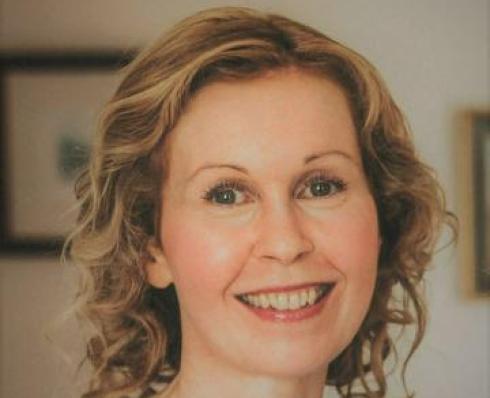
Alice McEleney is Assistant Professor in Psychotherapy in the School of Nursing, Psychotherapy and Community Health and Chair of the Doctorate in Psychotherapy programme. Her research interests focus on the role of psychotherapy in improving the mental health and well-being of trauma survivors.
Alice has a multi-disciplinary academic background in psychology, neuroscience, and psychotherapy. She completed a BA and PhD in experimental psychology at Trinity College Dublin, postdoctoral research in cognitive neuroscience at the National Institutes of Health and Carnegie Mellon University and trained as an integrative psychotherapist at The Tivoli Institute. She worked as a lecturer in psychology at Northumbria University, Mary Immaculate College, The Open University, and the University of Limerick, before joining DCU in 2023.
The goal of Alice’s research is to contribute to improving psychological well-being by understanding the processes involved in mental health, resilience, recovery, and psychological growth. Ongoing projects investigate how people maintain good mental health and well-being in the face of adversity; how people recover from potentially traumatic experiences; and the positive psychological changes that may occur following life challenges. A specific focus of this research is the role of psychotherapy in improving mental health and well-being in survivors of trauma.
Click here to read Dr. Alice McEleney's full profile, including publications.
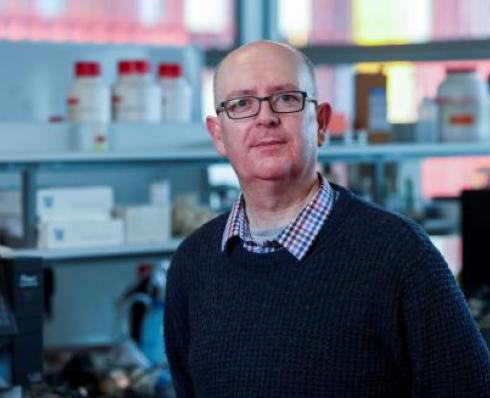
Enda McGlynn is a Professor in Materials Physics in the School of Physical Sciences, and a founder member of the National Centre for Plasma Science and Technology (NCPST). His research interests are in the synthesis, characterisation and application of nanoscale materials, in domains such as electronics, photonics and sensing. He has worked on a variety of materials systems including silicon, gallium nitride, zinc oxide, ceria and silica, and his areas of expertise include low temperature optical characterisation, x-ray diffraction and microscopy.
Enda has worked in materials physics for over 30 years. He studied Applied Physics in Dublin City University, followed by a PhD in Semiconductor Physics (also in DCU), as part of the Optronics Ireland Programme in Advanced Technology (PAT). He worked as a postdoctoral researcher in the Materials Group in the National Microelectronics Research Centre (now the Tyndall National Institute) on characterisation of metallic impurities in silicon as co-ordinator for OMMCOS (On-line Monitoring of Metallic COntamination in Semiconductors), an EU-funded project for the development of novel techniques for metal impurity level measurement in silicon wafers. He was also technical secretary of the CENELEC (European electronic standards committee; CLC/BT WG83-1) working group, with responsibility for the development of measurement standards for trace levels of metallic contaminants in silicon. He then returned to DCU as a temporary assistant lecturer, achieving tenure in 1999. He has held a number of responsible roles in DCU including Associate Dean for Research in the Faculty of Science and Health, Deputy Head of the School of Physical Sciences, Head of the School of Physical Sciences (2015-2018), and Chair of the University Examination Appeals Board.
His recent research has focussed on the study of polymer brush layers for ultimate application in self-organised block copolymer-based lithography, as well as the development of effective techniques for synthesis of 2D and 3D nanostructured silica deposits as well as for core-shell nanostructure architectures. Previous research concentrated on metal oxide materials and nanostructures where his group made ground-breaking contributions in the identification of defect structures in ZnO materials.
Prof McGlynn’s full profile including publications may be found here
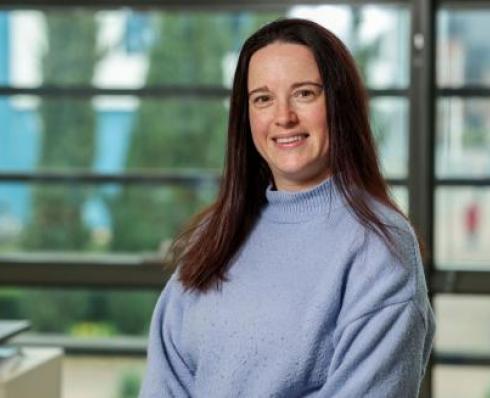
Justine Meiller is a Technical Officer in the Life Sciences Research Facility. She has been employed at DCU since 2007, formerly in the NICB, now a member of DCU Life Sciences Institute.
Her research area focuses on pancreatic cancer, monoclonal antibodies, and recombinant mammalian cell lines (CHO cells).
She is the manager of the Life Sciences Institute cell bank database, which is a legacy from the NCTCC/NICB, with cell lines from as far as 1984.
She is the production manager for BriClone™, a supplement for the cloning medium used in the post-fusion stages of hybridoma production and for improving the efficiency of hybridoma cells cloning.
Justine Meiller graduated from DCU in 2023 with an MSc in "Studies on Generation and Characterisation of Monoclonal Antibodies". She has recently started a PhD in DCU School of Biotechnology looking at investigating miRNAs in human pancreatic cancer – their functional role and possible therapeutic and diagnostic applications.
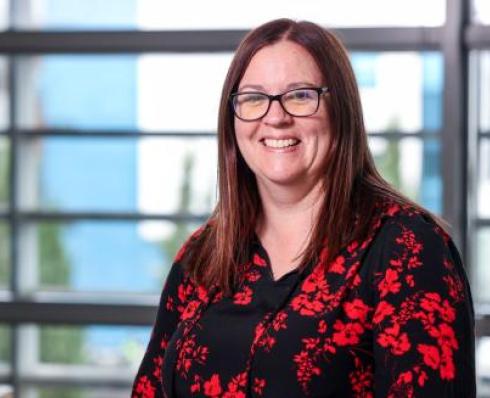
Paula Meleady is currently an Associate Professor in the School of Biotechnology, DCU. She is a Principal Investigator in research based on the proteomic characterisation of biopharmaceutical production cells to improve the efficacy of the production of biotherapeutics. She has over 25 years’ experience in mammalian cell culture and over 20 years of expertise built up in proteomics and protein/peptide mass spectrometry. As a senior research scientist at the National Institute for Cellular Biotechnology (NICB), she was tasked with establishing the Proteomics and Mass Spectrometry Core Facility over 18 years ago. This facility is now well-equipped with state-of-the-art high-end proteomics and mass spectrometry equipment, and associated software tools for data analysis.
As Principal Investigator of the Proteomics Laboratory and LSI member, her research interests include the proteomic and cellular posttranslational modification analysis and characterisation (including site-specific phosphorylation, ubiquitination) of recombinant mammalian cell lines (e.g. CHO cells) in order to gain insights to improving productivity of biopharmaceuticals. She also has research interests in the application of proteomics and mass spectrometry to identify new biomarkers and therapeutic targets in pancreatic cancer and drug resistant lung cancer.
Independent funding has come from SFI (e.g. Frontiers for the Future Award), Enterprise Ireland (e.g. Innovation partnerships with biopharma industry), Horizon 2020, HRB and the Irish Research Council to fund her research on the proteomic characterisation of CHO cells to improve bioprocess phenotypes and clinical proteomic analysis of disease progression in pancreatic cancer and lung cancer drug resistance. Dr. Meleady is also a Funded Investigator in SSPC (Science Foundation Ireland Research Centre for Pharmaceuticals). She has worked on a number of industrial biopharma collaborative projects and has enabled many collaborative studies in proteomics with clinicians and academic groups both nationally and internationally. She is the co-author of over 130 peer-reviewed publications (~ 40 as senior author) and has edited 2 books in research areas related to proteomics, bioprocessing and cancer. She is also the current Editor-in-Chief of the Springer journal, Biotechnology Letters.
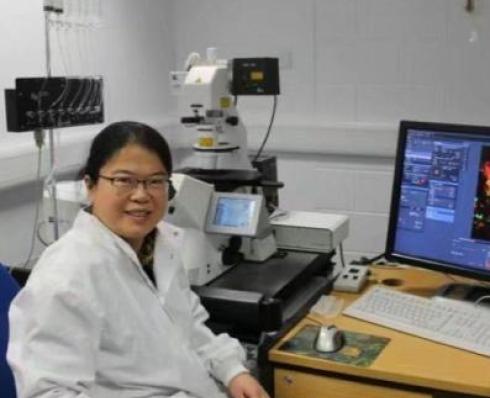
Dr. Jianghui Meng is a faculty member of the DCU Life Sciences Institute (LSI) and the School of Biotechnology at Dublin City University (DCU). Dr. Meng's research focuses on delineating signaling pathways in neuroimmunological disorders, elucidating neuro-immune network and its modulation in chronic diseases, and developing therapeutic strategies to alleviate symptoms and reduce associated economic burdens. As the principal investigator, Dr. Meng has been awarded funding both nationally and internationally, including the SFI Frontiers for the Future Award, LEO Pharma Research Grant in Open Competition, Sanofi Innovation Grant, and SFI SIRG grant.
Dr. Meng received her training in Neurotherapeutic research at the DCU International Centre for Neurotherapeutic Research, where she obtained her Ph.D., served as a Postdoc, and held a position as a Research Fellow from 2003 to 2014. She worked as a Senior Research Fellow in dermatological research at the University College Dublin (UCD) Charles Institute from 2014 to 2016 and achieved tenure at DCU in 2016. Her experience also includes cancer research at Imperial College London Medical School as a Research Assistant and at the National Institute of Cancer Research UK Cancer Drug Discovery Group as a Scientific Officer between 2001 and 2003.
Dr. Meng’s recent research has centred on elucidating the molecular mechanisms underlying dysfunction in the nervous and immune systems, covering chronic itch, chronic pain, type II diseases, and their associated morbidities. This focus has led to the identification of disease-driven pathways and targets, as well as the development of innovative analgesics, antipruritic treatments, and inhibitors targeting atopic dermatitis. Dr. Meng's group has established extensive international collaboration and partnerships with multiple companies and clinical units across various countries. Her group has pioneered several novel concepts for managing these conditions, resulting in transformative outcomes with mechanism-based, high-quality treatments.
Read Dr. Jianghui Meng’s full profile including publications here
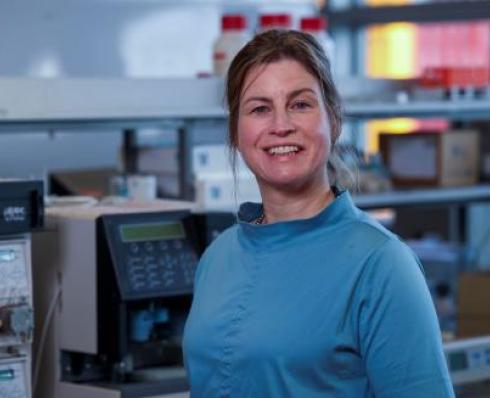
Aoife Morrin is Associate Professor of Analytical Chemistry in the School of Chemical Sciences and Director of the DCU Future Applied Science and Technology (FAST) Institute, jointly with Prof Deborah O’Connell. Her research interests are in biomaterials and biochemical sensor design for integrating with the human body for biomedical applications and environmental sensing.
Aoife previously served as the Director of the National Centre for Sensor Research (NCSR) at DCU since 2019. She held a lectureship at DCU since 2018 and prior to her academic position, her postdoctoral research was at DCU under Prof Malcolm Smyth following the completion of her PhD from DCU.
Dr Morrin’s research explores the harnessing of biomarkers from skin and in particular the volatile emission from skin, arising from host metabolite-skin microbiome interactions, is being investigated using mass spectrometry to understand links with human health and disease. Notably, her work has revealed unique signatures associated with the healthy individual as well as biomarkers of infection in wounds.
Read Aoife Morrin’s full profile including publications here
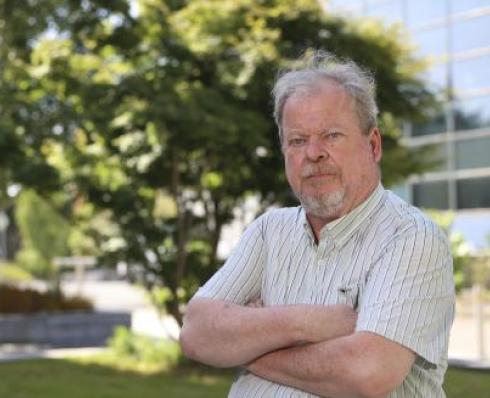
Kieran Nolan is an Associate Professor in the School of Chemical Sciences. He joined DCU in 1998 and became Assistant Professor in 2001. He was at the centre of the development team which created the new degree Chemical and Pharmaceutical Sciences starting in 2001, which became the School of Chemical Sciences flagship degree. Since joining DCU, Kieran Nolan has supervised/co-supervised 22 PhD students to completion. From 2014 - 2018 he was Head of the School of Chemical Sciences and he is currently the School Teaching Convenor (since 2021) and a member of the School Executive Committee since 2019.
Kieran Nolan’s research group has been involved in the areas of synthetic chemistry, medicinal chemistry, analytical science and environmental sciences. The Nolan group’s research endeavours have evolved into four streams: 1) ‘Green’ synthetic technologies, with particular emphasis on the development of new energy efficient microflow biocatalytic reactors that includes the design and preparation of new material technologies for enzyme immobilisation. 2) Medicinal chemistry - Development of potassium channel inhibitors - targeting multiple sclerosis, HIV inhibitors and fluorouracil prodrugs. 3) Environmental sciences including the removal of pollutants from industrial waste-water streams by sorption, membrane and photocatalytic techniques and environmental forensics. 4) Sensor development targeting ammonia/biogenic amines.
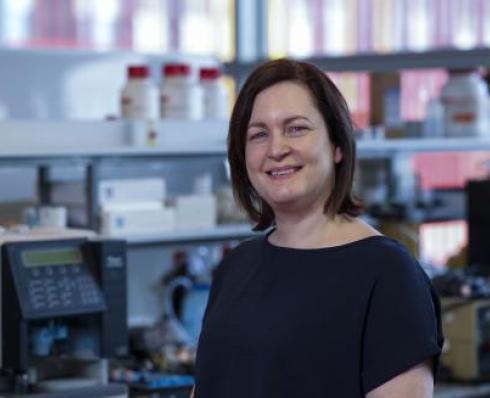
Deborah O’Connell is a Full Professor of Plasma Physics in the School of Physical Sciences and Director of the DCU Future Applied Science and Technology (FAST) Institute, jointly with Director Aoife Morrin. Her research interests are in developing plasma-based technologies to address challenges in diverse fields such as biomedical applications, environmental issues, and semiconductor processing.
Deborah previously served as the Director of the National Centre for Plasma Science and Technology (NCPST) at DCU. She joined DCU in 2020 through the Irish Government Senior Academic Leadership Initiative (SALI). Before joining DCU, Deborah held a Chair position and served as the Director of the York Plasma Institute at the University of York, UK. Prior to her positions at York, she held a UK EPSRC Career Acceleration Fellowship and an EU Marie Curie Fellowship at Queen’s University Belfast. Her postdoctoral research took place at Ruhr University Bochum in Germany, following the completion of her PhD from DCU.
O’Connell's research explores applications of low-temperature plasmas (LTP) in the life sciences, with a specific focus on developing cancer therapeutics and addressing antimicrobial resistance (AMR). Notably, her work has revealed the ability of LTP not only to kill cancer cells but also target the 'cancer stem cells', a crucial aspect in preventing cancer recurrence. Additionally, her research addresses healthcare-associated challenges, such as biofilms, particularly in hospitals. LTP, with its diverse species, is a potent tool in disrupting biofilms, providing a safe and efficient solution to combat the persistent problem of pathogen proliferation in healthcare settings.
Read Deborah O’Connell’s full profile including publications here
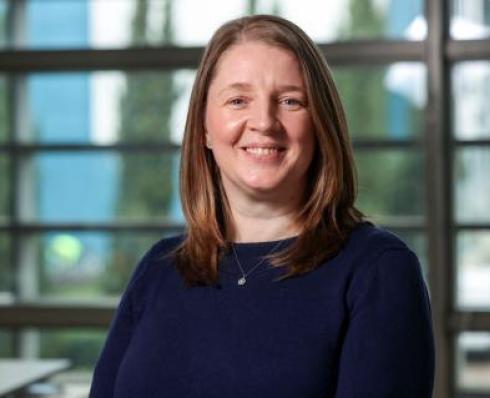
Dr Fiona O’Neill is a Research Fellow in the LSI. As a senior member of the pancreatic cancer research team in the LSI since 2014, she has been involved in the development of the pancreatic patient derived xenograft programme, in collaboration with SVUH. Her main research focus is on improving the use of radiotherapy in pancreatic cancer, with a focus on treatment differences between conventional and IMRT regimes as well as mechanisms of radiation resistance. This work is in collaboration with St Luke’s Radiation Oncology Network. Additionally she has an interest in the role miRNAs play in the development of pancreatic cancer.
Dr Fiona O’Neill completed her Ph.D. in 2014. Her thesis entitled “An examination of the pharmacology of HER2 inhibiter response in cellular models of breast cancer” looked at identifying gene expression markers of tyrosine kinase inhibitor response in HER2+ breast cancer cell lines.
Recent publication have explored the analysis of pancreatic cancer tumour samples using different “omic” approaches including proteomic, miRNA and mRNA microarray profiling of these sample types.
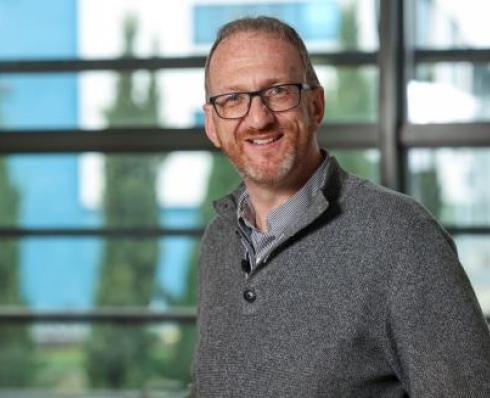
Dr. Finbarr O’Sullivan is the Principal Investigator of a research group whose interests focus on the micro nutrient environment and the cellular response of mammalian cells. The work involves the in-vitro modelling of cells and tissues with the application of such models to study disease processes and metallo-cellular interactions. This research uses arrange of molecular and proteomic methods to identify novel pathways and controls in cell and tissue growth and disease.
Dr. O’Sullivan has worked in cellular biology for over 25 years. His research has involved cellular mechanisms in response to cancer therapeutics, cellular and tissue differentiation, cellular and tissue biocompatibility with materials, and metallo-cellular response to micronutrients. He has experience in a range of mammalian in-vitro models for different tissues, diseases and processes. His research has involved working with clinicians in the Royal Victoria Eye and Ear Hospital and Irish Blood Transfusion Service, to develop and translate to the clinic the use of in-vitro cultured limbal stem cell transplants for cornea limbal epithelial stem cell deficiency. This technique provided Irish clinicians with a new treatment option for such deficiencies. It received regulatory approval from the HPRA and was used on June 2016 in the clinic for the first time and was recognised with the DCU Presidents Award for Innovation. He has previously involved in EU funded actions that involved the investigation of novel biomaterials. He has worked on a number of industrial collaborative projects which include improving productivity of biotherapeutics by CHO cells and is an investigatior in the SSPC, The Science Foundation Ireland Research Centre for Pharmaceuticals.
His research group has interests in the creation of advanced in-vitro cellular models to study metallo-cellular interactions and how changes in nutrients can alter protein translation. This research uses molecular and proteomic methodologies to identify novel pathways and controls in such cellular interactions.
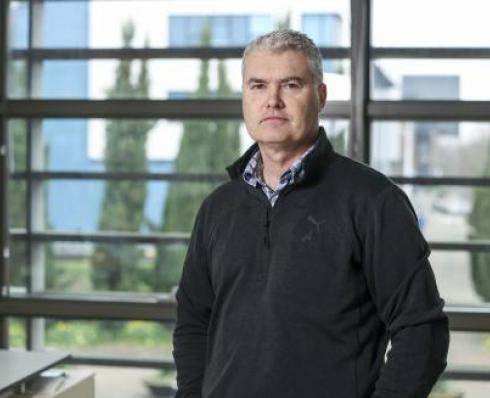
Ronan O’Toole is an Associate Professor in Biomedical Sciences in the School of Biotechnology. He was previously Associate Professor in Biomedical Sciences at La Trobe University, Senior Lecturer in Microbiology at the University of Tasmania, and Lecturer in Clinical Microbiology at Trinity College Dublin. Ronan has more than 20 years post-PhD experience researching infectious diseases at institutes that also include Imperial College London and Johns Hopkins University.
As a Principal Investigator and LSI member, his research interests are in the complementary areas of pathogen genomics and epidemiology as they relate to human health and illness. His work applies technologies in next-generation sequencing and computational biology to map the origin and spread of healthcare- and community- acquired infections and detect the acquisition of antibiotic resistance. Further research integrates biostatistics to ascertain the contribution of host and environmental risk factors to the incidence of infection and disease.
Ronan’s research aligns with the LSI’s Health Research Theme and its Antimicrobial Resistance Challenge. From his previous experience setting up and managing a Biosafety Level 2 (BSL2) Laboratory, he is co-establishing a BSL2 host-pathogen laboratory with colleagues in the School of Biotechnology. The latter facility is expected to offer other LSI researchers the opportunity to conduct research on human pathogens.
Read Associate Professor O’Toole’s research publications here
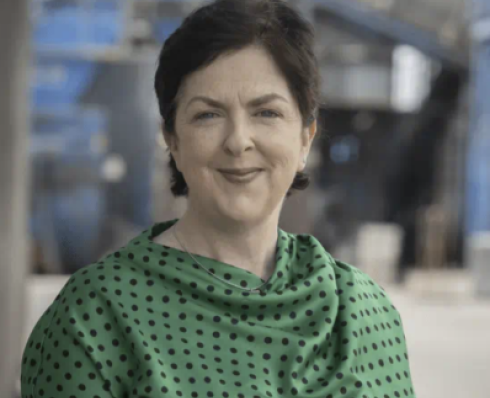
Fiona Regan is Full professor in Chemistry at the School of Chemical Sciences in Dublin City University and Director of the DCU Water Institute. Fiona’s research focuses on analytical chemistry in the field of environmental monitoring, and she has special interest in priority and emerging contaminants as well as the establishment of decision support tools for environmental monitoring using novel technologies and data management tools. Her work includes the areas of separations and sensors (including microfluidics), materials for sensing and antifouling applications on aquatic deployed systems.
Research career: [1994] PhD at Dublin City University [1994-1996] Post-doctoral researcher at Dublin City University [1996-2002] Lecturer at Limerick Institute of Technology [2002-2009] Lecturer/Senior Lecturer at Dublin City University [2009-current]; Beaufort PI in Sensors and Communications Technology (2009-2016); Full Professor at Dublin City University. Chairperson of Water4All EU partnership; Chairperson of Royal Irish Academy Climate Change and Environmental Sciences Committee.
Research expertise: Development of sensors and separation techniques for applications in water quality monitoring; aquatic biofouling and materials as antifouling solutions; application of Lab-on-a-Chip for water quality monitoring – including chemicals of emerging concern; decision support tools; water policy; engineering; sustainability; governance, citizen science.
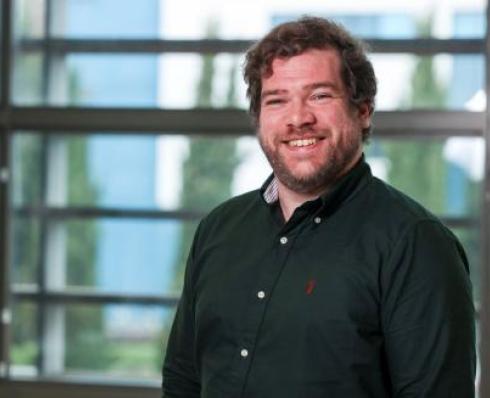
Keith Rochfort is an Assistant Professor in the School of Nursing, Psychotherapy, and Community Health (SNPCH) and a member of DCU’s Life Sciences Institute (LSI). As Principal Investigator of the Integrative Vascular Biology Group, his research interests focus on the physiological response of vascular system to endogenous and exogenous cues associated with health and disease states. His group aims to interpret and translate these findings to with a view of informing and contributing towards the discovery of therapeutic targets, biomarkers, and therapeutics.
Keith completed his undergrad in Analytical Science at Dublin City University, before then earning his PhD thesis on the molecular mechanisms of microvascular adaptation specific to the blood-brain barrier. Thereafter, he worked on and gained experience in vascular modelling and regenerative medicinal approaches in his post-doctoral studies; firstly in the Conway Institute at University College Dublin examining the therapeutic potential of erythropoietin mimetics in the pulmonary vascular disease, before returning to Dublin City University as part of a Science Foundation Ireland US-Ireland grant to investigate viral-based therapeutic strategies towards the treatment in the context of diabetic retinopathy. The latter earned him the Irish Endocrine Society’s O’Donovan Medal in 2019. Later that year, he was hired as an Assistant Professor, and subsequently established his own independent research group with support from Science Foundation Ireland, the Irish Research Council, and industry partnerships.
Recent research and publications from the Integrative Vascular Biology Group has focused on the development of in vitro and in vivo translational models of the vascular system to determine the influence of bioactive stimuli upon such, namely: (1) SARS-CoV-2, (2) physical trauma, (3) pharmaceuticals, and (4) environmental pollutants. With a strong translational focus and active collaborative links to clinical teams in St. Vincents and Beaumont Hospital, the group aims to inform and improve the current understanding of pathophysiology of vascular disease states towards the improvement of current prognostic, diagnostic, and treatment strategies.
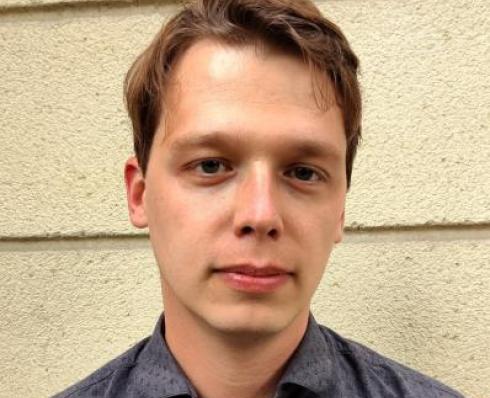
Gaetan Thilliez is an Assistant Professor in Computational Biology in the School of Biotechnology. His research focuses on evolution of microbes with a special interest on bacterial pathogens. Gaetan obtained an MSc in Plant Functional Biology at the University of Toulouse, France, followed by a PhD at the University of Dundee, United Kingdom. His doctoral studies focused on the host range of the plant pathogens Phytopthora infans and P. capsici. He then pursued postdoctoral work at the Quadram Institute, UK where he studied the evolution and adaptation of epidemic strains of Salmonella isolated from food, livestock and clinical cases. He contributed to numerous collaborations with research groups abroad, notably with the National Microbiology Reference Laboratory in Harare, Zimbabwe. He then moved to the University of Padua, Italy, where he focused on the prevalence of antibiotic resistant bacteria in the environment. In parallel, he developed an interest in bacteriophage research, especially regarding their impact on the evolution of bacteria.
Gaetan obtained a position at DCU in 2024. His area of expertise includes bioinformatics, genomics, epidemiology, microbiology, and molecular biology and his interest in the evolution and adaptation of pathogens fit within the LSI’s Health and Research theme and antimicrobial resistance challenge. He also provides bioinformatics support to other researcher in the School of Biotechnology and in LSI.
Read Assistant Professor Thilliez’s full profile and publication here
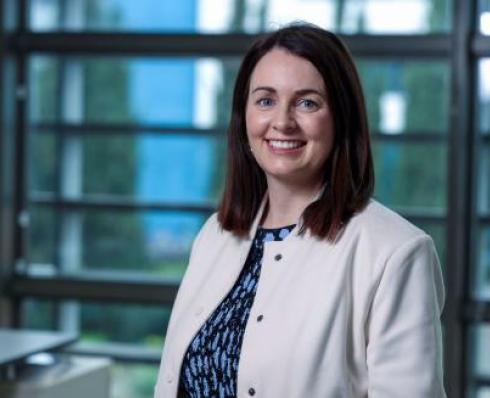
Dr. Naomi Walsh is an Associate Professor in Biomedical Science at the School of Biotechnology, DCU.
Dr. Walsh's current research is focused on developing organoid 3D cancer systems modelling the genomic landscape of rare and difficult to cure cancers to identify novel therapeutic strategies.
Naomi completed her PhD in Cancer Research in DCU and was awarded the outstanding graduate researcher for her contributions to research. She holds a Masters of Public Health (MPH) from University College Dublin. She conducted her post-doctoral research as a Cancer Prevention Fellow at the National Cancer Institute (NCI), USA. Upon her return to Ireland, Dr. Walsh held the HRB/Irish Cancer Society Cancer Prevention Fellow and subsequently was awarded a Science Foundation Ireland Starter Investigator Research Grant and established her independent research group.
Other interests of her research include (1) genomic and functional NGS approaches to overcome treatment resistance (2) understanding non-coding tumour diversity caused by genomic alterations which contributes to cancer resistance or long-term responses (3) identifying the prognostic/predictive signatures of genomic and immunological response.
Read Dr Walsh’s full profile including publications and funding here

Dr. Jiafu Wang is the Assistant Professor in Neurotherapeutics at the School of Biotechnology and a member of the DCU Life Sciences Institute (LSI), where he takes on the role of Principal Investigator for the Molecular Neurotherapeutics Laboratory. Dr. Wang's research focuses on pioneering developments in bio-therapeutics designed to address a spectrum of medical challenges, including itch, cancer, chronic pain and rheumatoid arthritis. Dr. Wang has won several SFI Awards, including the SFI Frontiers for the Future Awards, SFI Career Development Awards, SFI/EI Technology Innovation Development Award among others. He has also contributed significantly to awards from the Higher Education Authority (HEA), Enterprise Ireland, and International Pharmaceutical Companies.
Dr. Wang’s academic journey began with the completion of his PhD from Wuhan University in 1999. He was recruited immediately as a lecturer by the Institute of Life Sciences at the same institution. Within a year, Dr. Wang secured two fundamental research grants from Government Funding Bodies. In pursuit of expanding his research career, Jiafu joined the neuroscience research group at Imperial College London in 2000. Three years later, he became part of the newly established International Centre for Neurotherapeutics at DCU, solidifying his commitment to advancing neurotherapeutic research.
At the forefront of Dr. Wang's research is a profound commitment to advancing innovative bio-therapeutics, focusing primarily on the development of new treatments for various neurological disorders. He has been granted numerous international patents. In addition, Dr. Wang's research group has significantly contributed to the scientific community through a series of published articles that unveil intricate mechanisms underlying itch, pain, and inflammation pathogenesis. These contributions have been featured in international journals such as J Allergy Clin Immunol, J Invest Dermatol, Front Immunol, Br. J. Pharmacol, J Biol Chem, and others.
For a comprehensive overview of Dr. Jiafu Wang's research, his full profile is accessible here
Email: lsi@dcu.ie



